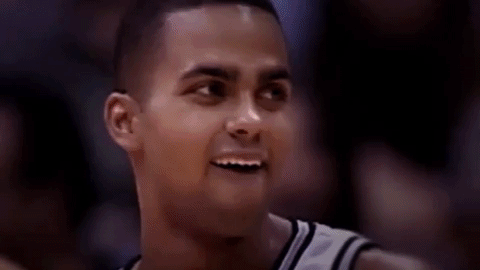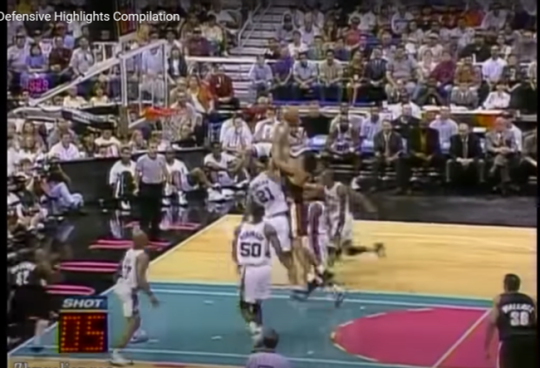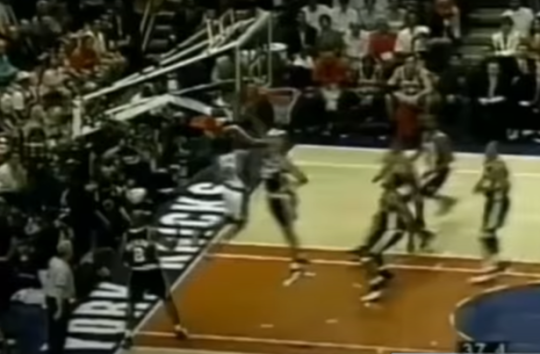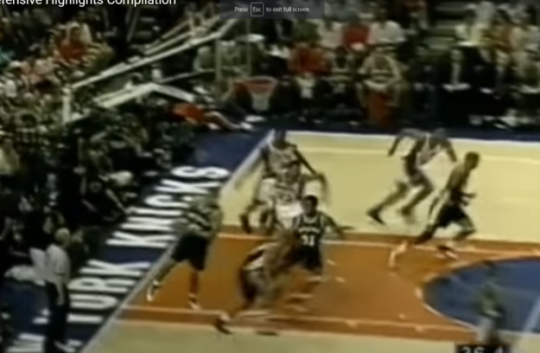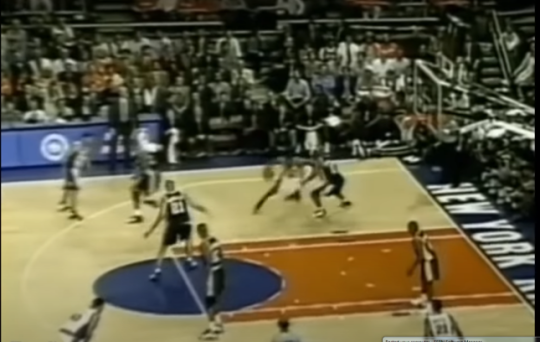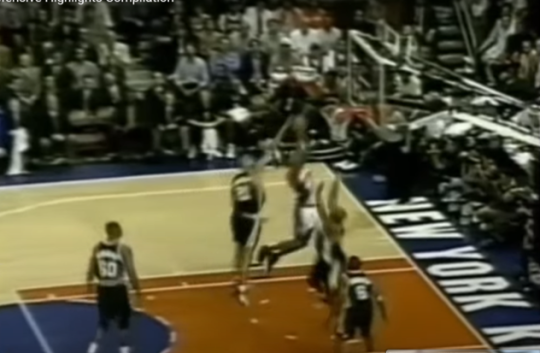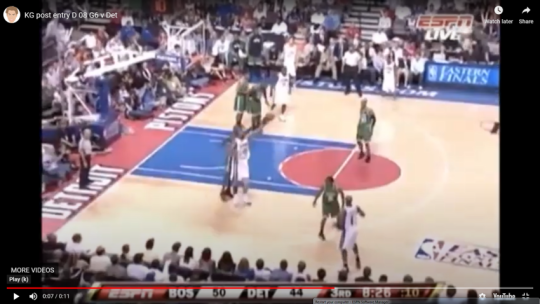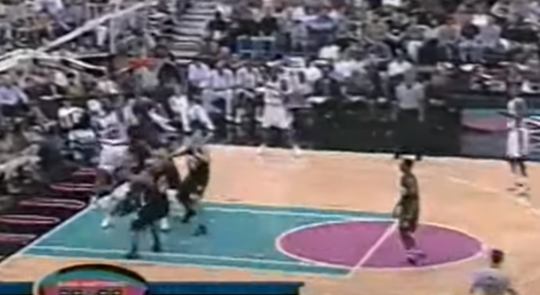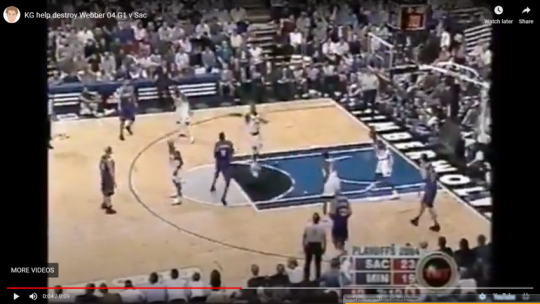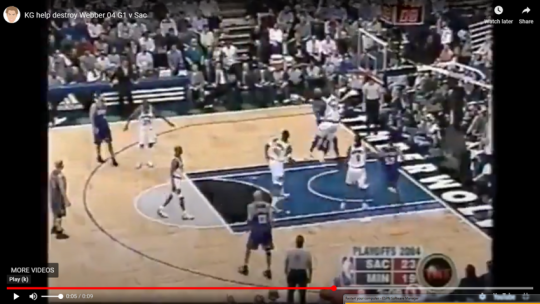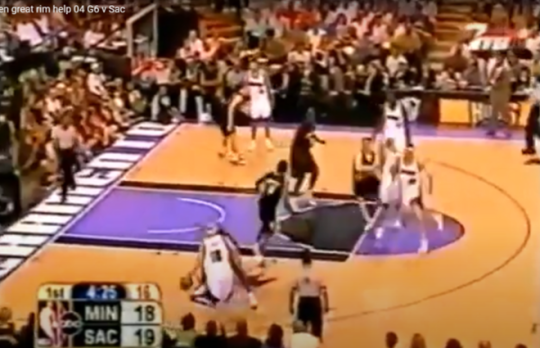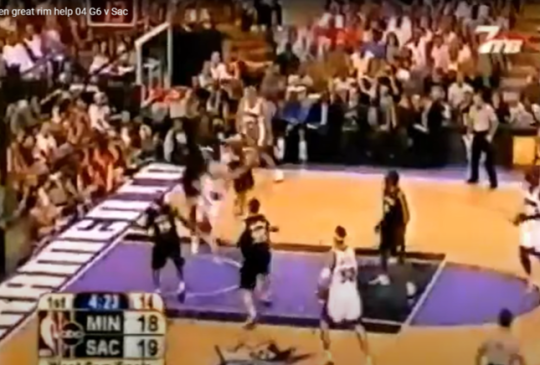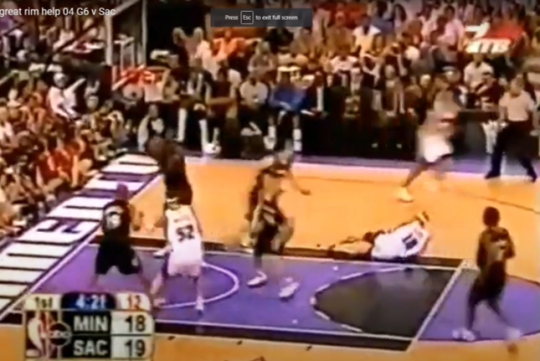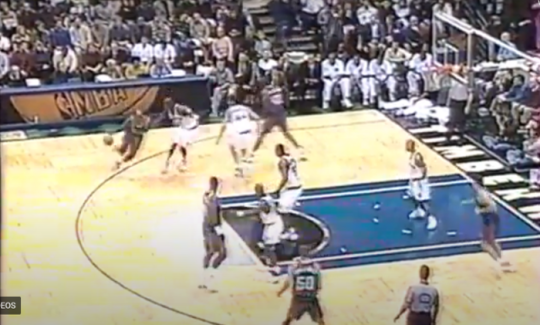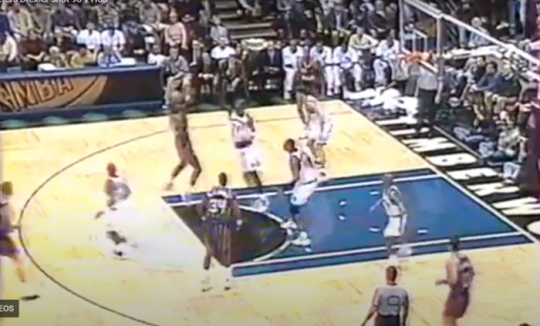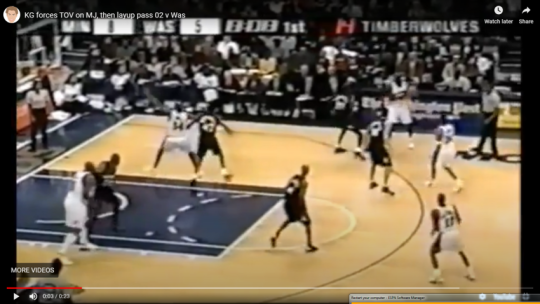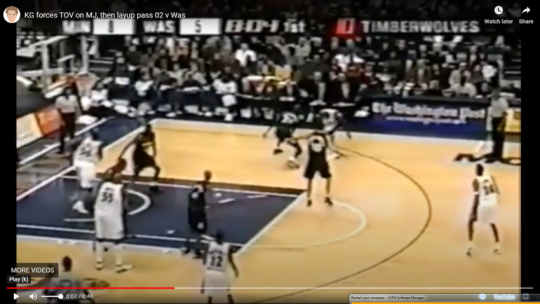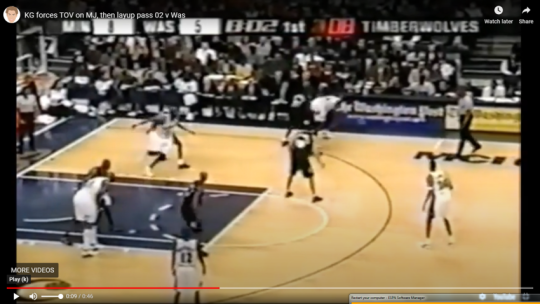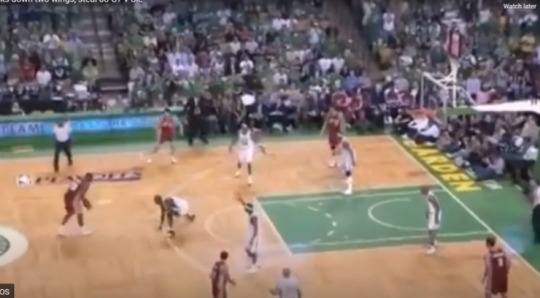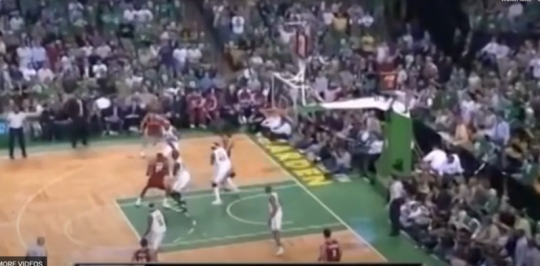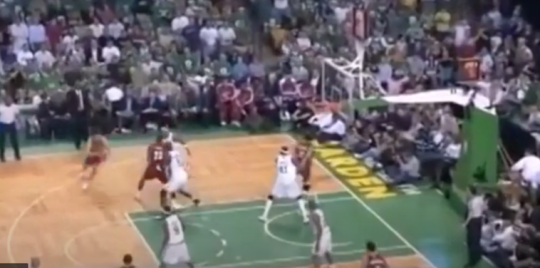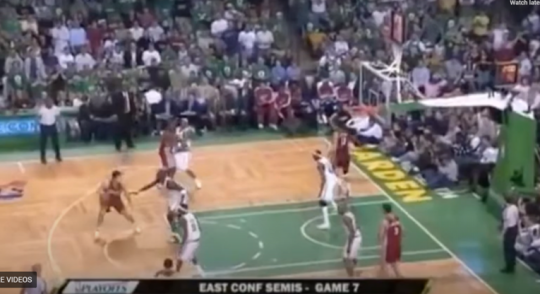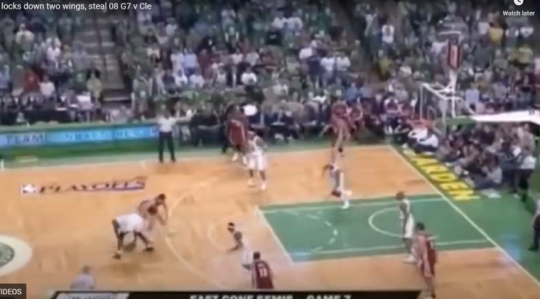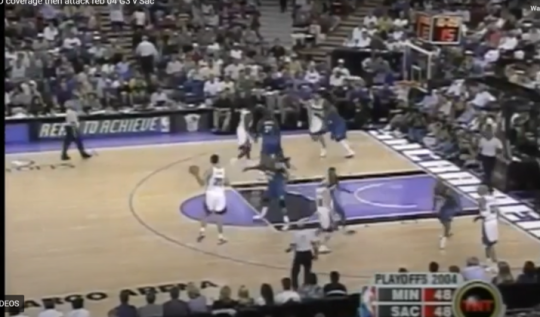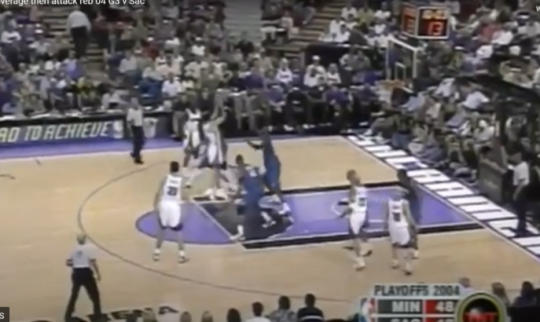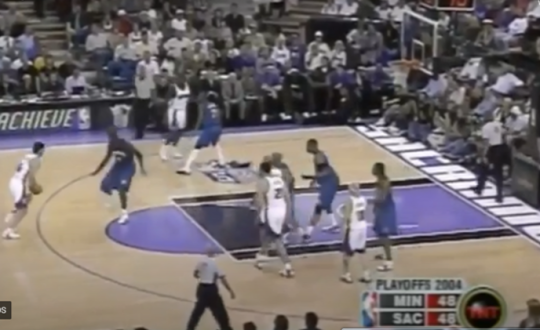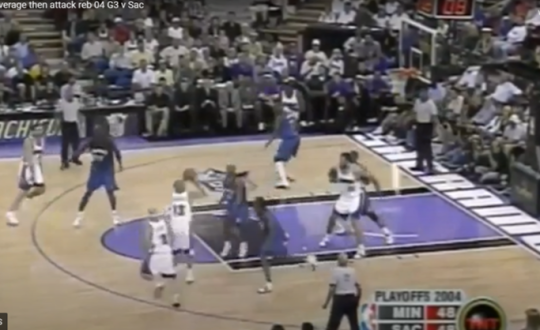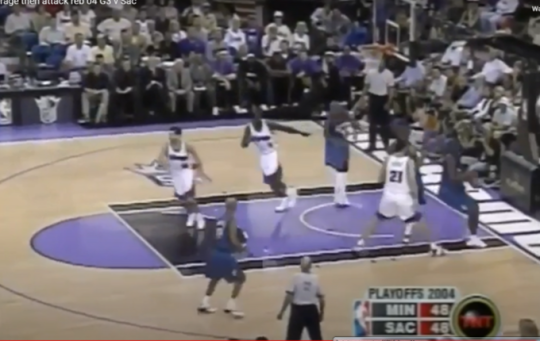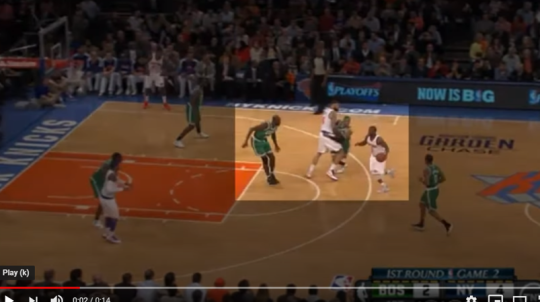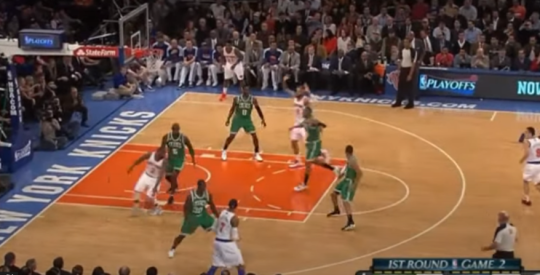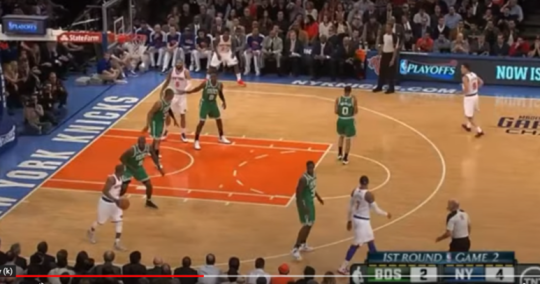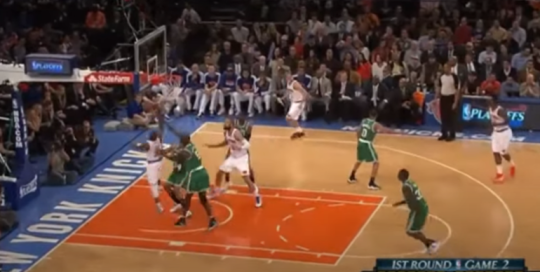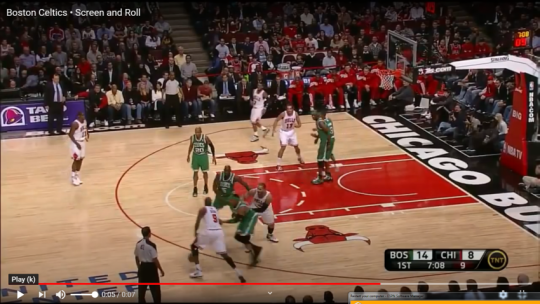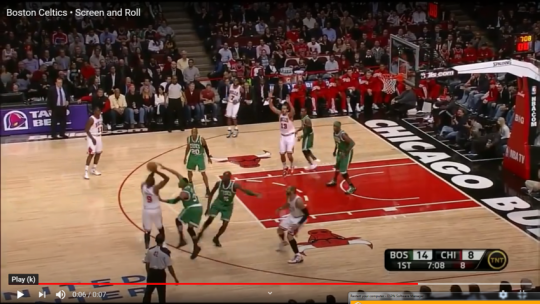RealGM 2020 Top 100 Project: #5 (Tim Duncan)
Moderators: Clyde Frazier, Doctor MJ, trex_8063, penbeast0, PaulieWal
Re: RealGM 2020 Top 100 Project #5
-
DQuinn1575
- Sixth Man
- Posts: 1,952
- And1: 712
- Joined: Feb 20, 2014
Re: RealGM 2020 Top 100 Project #5
5 Wilt
6 Duncan
7 Shaq
Wilt could do everything and did- score, rebound,defend, ball handle. By individual accomplishments he is #1. The 4 guys ahead of him all have way more team accomplishments so Wilt is 5: but no one else can say that.
Duncan and Shaq probably rate with Bird at peak and a little better than Magic but beat them high on career prime. I’m taking Duncan over Shaq, probably because I think him more versatile but i could be swayed.
6 Duncan
7 Shaq
Wilt could do everything and did- score, rebound,defend, ball handle. By individual accomplishments he is #1. The 4 guys ahead of him all have way more team accomplishments so Wilt is 5: but no one else can say that.
Duncan and Shaq probably rate with Bird at peak and a little better than Magic but beat them high on career prime. I’m taking Duncan over Shaq, probably because I think him more versatile but i could be swayed.
Re: RealGM 2020 Top 100 Project #5
-
Jordan Syndrome
- Sixth Man
- Posts: 1,814
- And1: 1,425
- Joined: Jun 29, 2020
-


Re: RealGM 2020 Top 100 Project #5
Mazter wrote:Jordan Syndrome wrote:Quick Glance:
In Dirks prime (01-14), he anchored the 4th, 1st, 1st, 1st, 4th, 1st, 2nd, 8th, 5th, 10th, 8th, 14th, 3rd ranked offenses.
Dirks 5.5 OBPM and 125.4 OWS over this stretch is comparable to Birds 5.5 OBPM and 75.1 OWS over this stretch. The fact Dirk logged more than 10,000 more minutes is huge. To put these numbers in perspective, Dirk logged 67% more Offensive Win Shares than Bird and 40% more minutes, meaning on a per-minute basis, Dirk was more impactful offensively than Bird.
The post-season tells a similar story, with Birds 5.8 OBPM slightly ahead of Dirks 5.3 OBPM but Dirks 17.3 OWS outmatching Birds 13.0 OWS in less minutes (6k more Bird, 5.5k for Dirk).
Dirks post-season blemishes are a very real cause for concern but the counterpoint to this is the fact the Mavericks played in a much more competitive era in the early 2000s. The Mavs were outmached by Duncans Spurs and Adelman's Kings on multiple occasions.
True, But is that really a big of a difference with Bird and Magic:
Bird -> 2nd, 5th, 4th, 6th, 6th, 6th, 3rd, 3rd , 1st
Magic -> 1st, 7th, 6th, 1st, 5th, 1st, 1st, 1st, 2nd, 1st, 1st, 5th
No, it isn't a big difference, and that is my point. Dirk was able to stay at a high, similar level as Bird for a longer period of time.
Besides that, there is also defense. Despite Magic never being a super defender he never hindered team defense. The Lakers were steadily a top 10 defense, while the Mavs were more out than in the top 10, spiking only once to the 5th defense. [/quote
Neither did Dirk. I would prefer to steer this discussion to Dirk vs Bird because they are more similar than Dirk vs Magic and Dirk has a stronger case over Bird than he does Magic.The whole 6th to about 15th is almost a pack for me. They are close to each other. This is the first time I participate in any discussion past 5th. So you never know, I could still change my mind. I'm gonna take a look into it.
I see, I look forward to it.
Re: RealGM 2020 Top 100 Project #5
- Baski
- Lead Assistant
- Posts: 4,533
- And1: 3,950
- Joined: Feb 09, 2017
-


Re: RealGM 2020 Top 100 Project #5
1. Tim Duncan
Peak and Prime
Merlin gave the Spurs a good 10-11 years of Superstar play right out of the gate. He was an All NBA/All Def mainstay throughout this period and the Spurs accordingly were elite defensively and won a **** ton of games behind his consistent excellence. His peak years had him winning the MVP in both, with 2003 having him only behind Ben Wallace among major minute players in Drtg, Top 3 in Blocks and Rebounds, Top 10 in scoring, top 5 in VORP, BPM, WS, PER, while playing more games than most of the guys who were ahead of him. Then stepped it up in the playoffs where he was either 1st or 2nd in all of these stats, while leading the fairly weak Spurs to series victories over very strong Western conference competition and then ended the season by eviscerating the Nets in the finals with a masterful 20-20-10 closeout performance, leaving no doubt who deserved the FMVP.
Contrary to some misguided opinions, peak Duncan was the type of guy you just gave the ball to and prayed for results, and to Pop's credit, that's exactly what he did in the early years.
Longevity
Merlin was great for a long time. He ended his career 11th in games played, 13th in minutes played, 17th in points (6th in POs), 7th in rebounds (3rd in POs), 6th in blocks (1st in POs), 7th in WS (3rd in POs), top 10 in PO PER, on and on.
He made both All NBA and All defense for 13 seasons straight, eventually totalling 15 selections for both, which is the most combined in NBA history. He was an elite defender from 1997 to 2016, which is crazy considering the other defensive greats either didn't play as long or dropped off in their late stages.
Of the remaining players in this project, he has the strongest longevity case.
Intangibles
Greatest leader in NBA history. Caused his team basically zero drama and set the tone for the team-first winning culture that defined them for the past 2 decades.
I mean where else but in San Antonio can you see a 2-time MVP, 5-time Champion, 3-time FMVP being scolded and benched like some rookie? As another player on the bench, you immediately see that and ask yourself: "Who the **** am I to cause a ruckus when this dude shows such restraint?" It was this exemplary leadership that led to 15 years separating his 1st and last titles, because nobody empowered their teammates like Timmy did.
He was the engine behind two of the most impressive championship runs in NBA history (2003 and 2014), with 3 others before and in between those years.
The biggest reason for the Spurs' consistent excellence, nobody embodies the phrase "you know what you're getting" more than Merlin.
In an all time draft, there are literally only 3 surer picks than Tim Duncan.
2. Wilt Chamberlain
I've always had Wilt immediately following Russell , so he'd be my next pick, but I've seen some arguments that might suggest there's a bigger gap between the two of them than I think. I'm looking to decide between him, Magic and Shaq based on the arguments I read in the proceeding threads.
Peak and Prime
Merlin gave the Spurs a good 10-11 years of Superstar play right out of the gate. He was an All NBA/All Def mainstay throughout this period and the Spurs accordingly were elite defensively and won a **** ton of games behind his consistent excellence. His peak years had him winning the MVP in both, with 2003 having him only behind Ben Wallace among major minute players in Drtg, Top 3 in Blocks and Rebounds, Top 10 in scoring, top 5 in VORP, BPM, WS, PER, while playing more games than most of the guys who were ahead of him. Then stepped it up in the playoffs where he was either 1st or 2nd in all of these stats, while leading the fairly weak Spurs to series victories over very strong Western conference competition and then ended the season by eviscerating the Nets in the finals with a masterful 20-20-10 closeout performance, leaving no doubt who deserved the FMVP.
Contrary to some misguided opinions, peak Duncan was the type of guy you just gave the ball to and prayed for results, and to Pop's credit, that's exactly what he did in the early years.
Longevity
Merlin was great for a long time. He ended his career 11th in games played, 13th in minutes played, 17th in points (6th in POs), 7th in rebounds (3rd in POs), 6th in blocks (1st in POs), 7th in WS (3rd in POs), top 10 in PO PER, on and on.
He made both All NBA and All defense for 13 seasons straight, eventually totalling 15 selections for both, which is the most combined in NBA history. He was an elite defender from 1997 to 2016, which is crazy considering the other defensive greats either didn't play as long or dropped off in their late stages.
Of the remaining players in this project, he has the strongest longevity case.
Intangibles
Greatest leader in NBA history. Caused his team basically zero drama and set the tone for the team-first winning culture that defined them for the past 2 decades.
I mean where else but in San Antonio can you see a 2-time MVP, 5-time Champion, 3-time FMVP being scolded and benched like some rookie? As another player on the bench, you immediately see that and ask yourself: "Who the **** am I to cause a ruckus when this dude shows such restraint?" It was this exemplary leadership that led to 15 years separating his 1st and last titles, because nobody empowered their teammates like Timmy did.
He was the engine behind two of the most impressive championship runs in NBA history (2003 and 2014), with 3 others before and in between those years.
The biggest reason for the Spurs' consistent excellence, nobody embodies the phrase "you know what you're getting" more than Merlin.
In an all time draft, there are literally only 3 surer picks than Tim Duncan.
2. Wilt Chamberlain
I've always had Wilt immediately following Russell , so he'd be my next pick, but I've seen some arguments that might suggest there's a bigger gap between the two of them than I think. I'm looking to decide between him, Magic and Shaq based on the arguments I read in the proceeding threads.
Re: RealGM 2020 Top 100 Project #5
-
Owly
- Lead Assistant
- Posts: 5,721
- And1: 3,193
- Joined: Mar 12, 2010
Re: RealGM 2020 Top 100 Project #5
TrueLAfan wrote:Odinn21 wrote:I think Olajuwon is the player whose career perception had the most drastic value increase with a coach.
I hope my wording is proper because I am not saying Olajuwon benefited from a coach the most. What I'm saying is Rudy T becoming the Rockets head coach is the most drastic increase for a player's career value.
Without Rudy T, maybe Olajuwon would've never unlocked his true peak level.
Great point. I really think the idea that Hakeem’s basketball skills all came from his footwork dominated the thinking of Don Chaney and Bill Fitch. They just seemed confused by Ralph Sampson's ball handling, and tried to make Hakeem play like an old school inside finisher rather than as part of an offense. He would bust out with a big 6 or 7 assist game, and the staff treated those like infections that had to be stopped. Rudy really let Hakeem get the ball as a focal point of an offense, rather than someone who you dumped it into for scoring. I think Hakeem could have done that a few years earlier, too—maybe not in his first 2-3 years, but probably after that—and shown himself to be a more complete and valuable player than he was (and he was still a top 5-8 player most of his first 8 seasons).
Any sources for this?
Thanks.
Re: RealGM 2020 Top 100 Project #5
-
Owly
- Lead Assistant
- Posts: 5,721
- And1: 3,193
- Joined: Mar 12, 2010
Re: RealGM 2020 Top 100 Project #5
Mazter wrote:Jordan Syndrome wrote:Quick Glance:
In Dirks prime (01-14), he anchored the 4th, 1st, 1st, 1st, 4th, 1st, 2nd, 8th, 5th, 10th, 8th, 14th, 3rd ranked offenses.
Dirks 5.5 OBPM and 125.4 OWS over this stretch is comparable to Birds 5.5 OBPM and 75.1 OWS over this stretch. The fact Dirk logged more than 10,000 more minutes is huge. To put these numbers in perspective, Dirk logged 67% more Offensive Win Shares than Bird and 40% more minutes, meaning on a per-minute basis, Dirk was more impactful offensively than Bird.
The post-season tells a similar story, with Birds 5.8 OBPM slightly ahead of Dirks 5.3 OBPM but Dirks 17.3 OWS outmatching Birds 13.0 OWS in less minutes (6k more Bird, 5.5k for Dirk).
Dirks post-season blemishes are a very real cause for concern but the counterpoint to this is the fact the Mavericks played in a much more competitive era in the early 2000s. The Mavs were outmached by Duncans Spurs and Adelman's Kings on multiple occasions.
True, But is that really a big of a difference with Bird and Magic:
Bird -> 2nd, 5th, 4th, 6th, 6th, 6th, 3rd, 3rd , 1st
Magic -> 1st, 7th, 6th, 1st, 5th, 1st, 1st, 1st, 2nd, 1st, 1st, 5th
Besides that, there is also defense. Despite Magic never being a super defender he never hindered team defense. The Lakers were steadily a top 10 defense, while the Mavs were more out than in the top 10, spiking only once to the 5th defense.
"Top 10" in a 23 team league and a 29-30 team league are quite different things. Worth looking whether a better, more precise metric would support the same point.
The idea that Magic wasn't harmful to the Lakers in particular on D (not itself clear and not necessarily justified by team competence overall) could also be argued to be good/lucky teambuilding (either Lakers had another 1 who could guard ones better - Nixon - or a smallish 2 and generally multiple players at least somewhat able to slide down a position on D [Scott, Worthy, Cooper (super versatile), Green, Perkins etc] to cover what would be harmful.
Re: RealGM 2020 Top 100 Project #5
-
90sAllDecade
- Starter
- Posts: 2,264
- And1: 818
- Joined: Jul 09, 2012
- Location: Clutch City, Texas
-


Re: RealGM 2020 Top 100 Project #5
This is a repost from a thread comparing Duncan vs Hakeem in Ortg.
Okay, so just to touch on a few interesting things in these comparisons.
Ortg & Drtg Flaws
Ortg and Drtg are known for having inaccuracy flaws with comparing players who play the same lineup having the same or similar scores, which makes it less accurate to clearly seperate the best players on the team.
Using Tim Duncan, a great player as an example. On his 01-02 Spurs team here are the Ortg and Drtgs for the regular season:
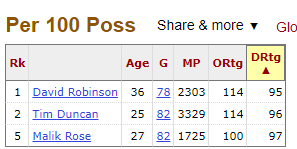
Based on Ortg and Drtg, David Robinson at 36 years old was more impactful overall than Tim Duncan during his peak, with Malik Rose very close in Drtg behind them. But that that doesn't sound correct, right?
If you look at OBPM and DBPM, you can see a clearer picture of who was accurately the best player on the team.
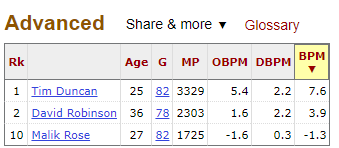
So if your coach played you in the same lineup and similar minutes as an Olympic Dream Team, you could stay out of the way as the HOF players dominate the game, and could possibly have similar Ortg or Drtg but not be as good a player.
Although still not perfect, OBPM/DBPM seems more accurate than Ortg & Drtg in the comparision, and also has League Average already built into it.
Now having said that, any comparision with Hakeem can't ignore playoff production.
I value playoffs higher than regular season as it has a higher percentage of being more difficult with teams with on average having better records, offensive & defensive talent, good coaches are usually there and teams game plan to beat you for a whole series.
To briefly address previous points, here is a comparison of Hakeem and Duncan offensively using OBPM in the playoffs:
Offense: Hakeem vs. Duncan OBPM in the Playoffs
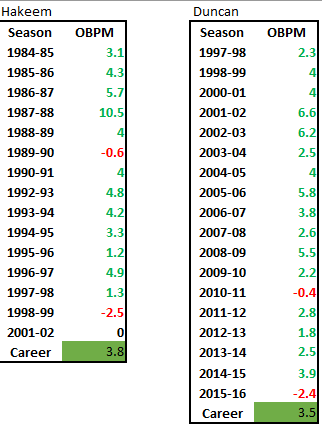
So Hakeem has a higher peak and on average was better offensively using OBPM in the playoffs over thier careers.
Why not go all the way and include DPBM for all three players? Here is Olajuwon, Shaq and Duncan for BPM over thier playoff careers.
Hakeem vs. Duncan vs. Shaq Career BPM in Playoffs
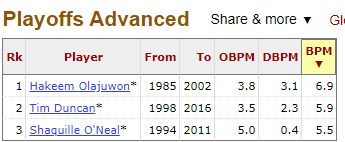
Duncan is an all time great and excellent in the RS in comparision to these two although it's close, Shaq is a beast offensively and Hakeem is the best defensive player among the three, but we knew that.
But when you combine offensive and defensive impact, Hakeem is the better player overall in BPM in the playoffs over thier careers.
Vote
1. Hakeem
2. Duncan
3. Shaq
Okay, so just to touch on a few interesting things in these comparisons.
Ortg & Drtg Flaws
Ortg and Drtg are known for having inaccuracy flaws with comparing players who play the same lineup having the same or similar scores, which makes it less accurate to clearly seperate the best players on the team.
Using Tim Duncan, a great player as an example. On his 01-02 Spurs team here are the Ortg and Drtgs for the regular season:

Based on Ortg and Drtg, David Robinson at 36 years old was more impactful overall than Tim Duncan during his peak, with Malik Rose very close in Drtg behind them. But that that doesn't sound correct, right?
If you look at OBPM and DBPM, you can see a clearer picture of who was accurately the best player on the team.

So if your coach played you in the same lineup and similar minutes as an Olympic Dream Team, you could stay out of the way as the HOF players dominate the game, and could possibly have similar Ortg or Drtg but not be as good a player.
Although still not perfect, OBPM/DBPM seems more accurate than Ortg & Drtg in the comparision, and also has League Average already built into it.
Now having said that, any comparision with Hakeem can't ignore playoff production.
I value playoffs higher than regular season as it has a higher percentage of being more difficult with teams with on average having better records, offensive & defensive talent, good coaches are usually there and teams game plan to beat you for a whole series.
To briefly address previous points, here is a comparison of Hakeem and Duncan offensively using OBPM in the playoffs:
Offense: Hakeem vs. Duncan OBPM in the Playoffs

So Hakeem has a higher peak and on average was better offensively using OBPM in the playoffs over thier careers.
Why not go all the way and include DPBM for all three players? Here is Olajuwon, Shaq and Duncan for BPM over thier playoff careers.
Hakeem vs. Duncan vs. Shaq Career BPM in Playoffs

Duncan is an all time great and excellent in the RS in comparision to these two although it's close, Shaq is a beast offensively and Hakeem is the best defensive player among the three, but we knew that.
But when you combine offensive and defensive impact, Hakeem is the better player overall in BPM in the playoffs over thier careers.
Vote
1. Hakeem
2. Duncan
3. Shaq
Re: RealGM 2020 Top 100 Project #5
- Odinn21
- Analyst
- Posts: 3,514
- And1: 2,942
- Joined: May 19, 2019
-

Re: RealGM 2020 Top 100 Project #5
90sAllDecade wrote:Using Tim Duncan, a great player as an example. On his 01-02 Spurs team here are the Ortg and Drtgs for the regular season:
Based on Ortg and Drtg, David Robinson at 36 years old was more impactful overall than Tim Duncan during his peak, with Malik Rose very close in Drtg behind them. But that that doesn't sound correct, right?
I don't think you know what you're looking at.
ORtg and DRtg numbers on player and team profile pages on BBRef are the calculation of the player had his box score production over 100 possession in a 48 minute play time.
They are not the +/- driven data we're talking about when it comes to defensive impact.
Full game logs are only available since 1996-97. So, it's not possible to have +/- data before that.
Also, RAPM's goal is to eliminate effect of situational lineups. PIPM is a composite of +/- data and box score data. The issue you're talking about is already addressed by some creators.
Another thing is sample size issue for +/- data. To establish a healthy baseline from statistical POV, there should be at least 30ish measurements, in this case games, but no one plays that many games in the playoffs.
I don't know if you picked OBPM/BPM arguments because they fit your opinion, but looking at those numbers, you're basically rewarding Olajuwon for being out of picture in the playoffs at the age Duncan was competing for titles with a lesser offensive role.
Here;
viewtopic.php?f=64&t=1971138
In their respective primes
Duncan had 4.0 obpm in regular seasons and 4.7 in 129 playoffs games (from '99 to '07)
Olajuwon had 2.7 obpm in regular seasons and 4.3 in 102 playoffs games (from '86 to '95)
I don't like taking any numbers at a face value. But if that's the case for you, these are the numbers.
The issue with per75 numbers;
36pts on 27 fga/9 fta in 36 mins, does this mean he'd keep up the efficiency to get 48pts on 36fga/12fta in 48 mins?
The answer; NO. He's human, not a linearly working machine.
Per75 is efficiency rate, not actual production.
36pts on 27 fga/9 fta in 36 mins, does this mean he'd keep up the efficiency to get 48pts on 36fga/12fta in 48 mins?
The answer; NO. He's human, not a linearly working machine.
Per75 is efficiency rate, not actual production.
Re: RealGM 2020 Top 100 Project #5
-
Owly
- Lead Assistant
- Posts: 5,721
- And1: 3,193
- Joined: Mar 12, 2010
Re: RealGM 2020 Top 100 Project #5
90sAllDecade wrote:This is a repost from a thread comparing Duncan vs Hakeem in Ortg.
Okay, so just to touch on a few interesting things in these comparisons.
Ortg & Drtg Flaws
Ortg and Drtg are known for having inaccuracy flaws with comparing players who play the same lineup having the same or similar scores, which makes it less accurate to clearly seperate the best players on the team.
Using Tim Duncan, a great player as an example. On his 01-02 Spurs team here are the Ortg and Drtgs for the regular season:
Based on Ortg and Drtg, David Robinson at 36 years old was more impactful overall than Tim Duncan during his peak, with Malik Rose very close in Drtg behind them. But that that doesn't sound correct, right?
If you look at OBPM and DBPM, you can see a clearer picture of who was accurately the best player on the team.
So if your coach played you in the same lineup and similar minutes as an Olympic Dream Team, you could stay out of the way as the HOF players dominate the game, and could possibly have similar Ortg or Drtg but not be as good a player.
Although still not perfect, OBPM/DBPM seems more accurate than Ortg & Drtg in the comparision, and also has League Average already built into it.
Now having said that, any comparision with Hakeem can't ignore playoff production.
I value playoffs higher than regular season as it has a higher percentage of being more difficult with teams with on average having better records, offensive & defensive talent, good coaches are usually there and teams game plan to beat you for a whole series.
To briefly address previous points, here is a comparison of Hakeem and Duncan offensively using OBPM in the playoffs:
Offense: Hakeem vs. Duncan OBPM in the Playoffs
So Hakeem has a higher peak and on average was better offensively using OBPM in the playoffs over thier careers.
Why not go all the way and include DPBM for all three players? Here is Olajuwon, Shaq and Duncan for BPM over thier playoff careers.
Hakeem vs. Duncan vs. Shaq Career BPM in Playoffs
Duncan is an all time great and excellent in the RS in comparision to these two although it's close, Shaq is a beast offensively and Hakeem is the best defensive player among the three, but we knew that.
But when you combine offensive and defensive impact, Hakeem is the better player overall in BPM in the playoffs over thier careers.
Vote
1. Hakeem
2. Duncan
3. Shaq
Seems like an oversight to compare a guy who played circa a twentieth of his playoffs minutes aged 35 or over and one who played over a fifth of them at that age range on their career averages without noting that one played considerably more of those minutes at an advanced age. Projecting Olajuwon to do as well as Duncan did playing more at such an age would be ... optimistic.
Given Duncan is 6th in the VORP era for VORP, Olajuwon 17th, any real heavy believer in BPM would have to tilt very heavily toward the smaller sample of the playoffs.
Re: RealGM 2020 Top 100 Project #5
-
TrueLAfan
- Senior Mod - Clippers

- Posts: 8,265
- And1: 1,795
- Joined: Apr 11, 2001
Re: RealGM 2020 Top 100 Project #5
Owly wrote:TrueLAfan wrote:Odinn21 wrote:I think Olajuwon is the player whose career perception had the most drastic value increase with a coach.
I hope my wording is proper because I am not saying Olajuwon benefited from a coach the most. What I'm saying is Rudy T becoming the Rockets head coach is the most drastic increase for a player's career value.
Without Rudy T, maybe Olajuwon would've never unlocked his true peak level.
Great point. I really think the idea that Hakeem’s basketball skills all came from his footwork dominated the thinking of Don Chaney and Bill Fitch. They just seemed confused by Ralph Sampson's ball handling, and tried to make Hakeem play like an old school inside finisher rather than as part of an offense. He would bust out with a big 6 or 7 assist game, and the staff treated those like infections that had to be stopped. Rudy really let Hakeem get the ball as a focal point of an offense, rather than someone who you dumped it into for scoring. I think Hakeem could have done that a few years earlier, too—maybe not in his first 2-3 years, but probably after that—and shown himself to be a more complete and valuable player than he was (and he was still a top 5-8 player most of his first 8 seasons).
Any sources for this?
Thanks.
A 1993 SI article said this:
Much of the criticism leveled at Olajuwon throughout his career centered on his inability or unwillingness to pass out of the double and triple teams that he invariably draws. Olajuwon distrusted the men around him and felt that Houston's best chance to win was for him to duck and spin and sometimes just machete his way through the human jungle.
Hakeem had always been a coachable guy; the fact that he felt that way was more on Fitch and Chaney than some suddenly discovered talent or ability. Fitch ran his offenses … traditionally. Big men stayed in the paint; offenses ran through the guards. Ralph Sampson wasn't like that; he and Fitch brawled. Fitch wanted to Sampson play more of a low post game and get his shots via John Lucas; Sampson wanted to bring the ball up. This quote from SI in 1986 says a lot:
Akeem is not yet a good passer, but he's working on it. Says the Dream, "I want someday to see the whole floor like Ralph does."
It should be noted, however, that the way Ralph Sampson sees the floor is not always the way Bill Fitch sees it … Fitch says, "Ralph is the kind of guy you have to motivate once in a while." Translation: He's got to go inside and rough it up a little more, knock a few people over and stop toying with the outside game he loves so well.
Actually, Hakeem could already see the court just fine, as he showed when circumstances dictated. Hakeem was forced to pass the rock more when Sampson got hurt in 1986; he responded by averaging 3.4 apg in the 28 games when Sampson was out in Feb. and March 1987. In 1989, John Lucas went down for the last 27 games of the season. Hakeem took over more of the offensive duties in terms of distributing. The Rockets, who had been under .500, went 16-11. Hakeem averaged 3.4 apg. And it meant … nothing. Hakeem got hurt in 90-91, and simply was not used a facilitator and lead offensive figure as much as he could have been by those coaches.
When Chaney was fired in 1992, Hakeem was averaging 2 assists a game. He averaged 30% more the rest of the season, and more as the season wound down. That progression went on into the next season. Rudy T had been an assistant under both Fitch and Chaney; As Hakeem said in that 1993 article in SI, “I may have wanted to leave last year, but I never really had a direction, so maybe I was meant to stay.”

Re: RealGM 2020 Top 100 Project #5
-
ardee
- RealGM
- Posts: 15,320
- And1: 5,397
- Joined: Nov 16, 2011
Re: RealGM 2020 Top 100 Project #5
ardee wrote: I am voting Wilt here. From my part, I am going to use the same post that I made when I voted for him in 2014. I could make a new post but IMO that one was extremely comprehensive and provided a ton of context for all the criticisms leveled by his detractors on this board.Let's take a look at his year-by-year career.
Early days
1960: Rookie year. This year is villified by many for his efficiency, and admittedly it's not as pretty as it'll be later on, but consider this... He comes onto a team with a terribly inefficient Guy Rodgers, Tom Gola and an aging Paul Arizin as his only decent team-mates. There was NO spacing on that team, and the lane was still narrow. Wilt used to get SWARMED. The team was a -2.3 SRS team the year before, it was +2.8 when Wilt arrived. He turned the second worst team in the league to the second best. His defense was great that year, he was blocking 15 shots a game according to stories. Won the MVP over a prime Russell. Honestly, don't see how this isn't the second best rookie season ever after Kareem. Start of a legendary career.
1961: One of his weaker years. His efficiency from the field improves, gets to work on that fadeaway jumper (which people love to hate on, but it LED THE LEAGUE in FG%, so I guess it worked at the time). Arizin is even older, a rookie Al Attles doesn't help TOO much... But Wilt still gets them to the Playoffs, puts up a 37/23, but his supporting cast flops BADLY. Arizin, Gola and Rodgers combined to shoot 31% from the field. Warriors get swept by the Royals. Can't blame Wilt here, his team stunk it up.
1962: The first glimpse of prime Wilt. Sets all time scoring and rebounding records, absolutely carried a worsening cast. Rodgers was completely awful as an offensive player now, shot 35.6% from the field. All his help is Arizin and Gola. Still no real shooting on the team. Wilt is great on both ends of the court, somehow makes them the second best team in the league, and comes one Sam Jones jumper away from upsetting the greatest dynasty in sports. AGREED Russ did a good job on him in the EDF, but really, if that jumper had missed, Wilt would be hailed as the 33/25 hero who single-handedly defeated the ultimate dynasty. Since he lost, people vilify this year for his scoring dropping somewhat AGAINST THE GOAT DEFENDER. Not saying this year was perfect but it really doesn't get the credit it deserves.
1963: His team dropped off a good bit, but seriously... We're talking a team with no shooting, no defense, had Arizin retire, Gola miss 60 games, and Wilt still has the team make league average offense AND defense? With that kind of supporting cast, blame the guy who goes 45/25, leads the league in FG% and anchors the defense? Where is the logic here?
I'm going to go on a bit of a rant here but this is where standards are shifted for Wilt. In 2006 and 2007 people make all kinds of excuses for KG regarding his supporting cast and multiple problems he faced. Yet he NEVER had this kind of situation. This would be the equivalent of the 2015 Heat having Bosh leave, Wade miss 60 games, and then expect LeBron to match his previous season's results. Wilt was depending on Guy Rodgers, who was shooting 38.7% from the field, to be his second option. It is bull to blame Wilt for this season's results, given all he did. This was probably his second best pre-prime year. You can put Russell, Kareem, anyone on that team and the results do not get better. He had one of the worst supporting casts in history.
Prime Wilt
1964: GOAT-level year. This was possibly Wilt at his best. His scoring drops a little bit but the efficiency goes up, and he becomes the consensus second best defender after Russ. The Warriors were a -6 defensive team, the second best mark of the era by any team besides the Russell Celtics (and the same mark people were going gaga over for the Pacers earlier this season). Wilt also becomes a part-time high post facilitator, finishing 6th in the league in assists. He ups his efficiency in the Playoffs, and makes his first Finals, losing to the GOAT defensive team. This is legendary stuff. The load he carried on both ends was ridiculous. His defense this year consistently gets underestimated. He was like a combination of Russell and Shaq, this was domination on another level. 35 ppg on 55% FG in the Playoffs, playing Russell? In that era? My God.
1965: He drops off a bit due to the heart disease. Bad team results in the beginning of the year. If you want to hold that against him, fine. He gets traded to Philly because the SFW management is full of asses. Philly immediately improves, they go 11-3 in the first 14 games with Wilt. Then Greer, Costello and Jackson all get injured in the second half of the season. Wilt still drags them to .500 and then outplays Russ in the EDF, losing because HAVLICEK STOLE THE BALL. This is the second time that one play has decided whether or not Wilt beats Russell.
1966: Start of peak Wilt. He takes his efficiency to a new level... 54% from the field on 25 FGA/game. Continues helping out with playmaking from the high post. He is now the undoubted best player in the league, taking the conch from Russell. The Sixers go 55-25. Wilt has a good supporting cast now but it's not THAT good. Greer was great, the perfect second option for Wilt. Walker was a nice do-it-all guy, but neither of them were particularly efficient. Billy C was too young to be a huge factor, Dolph Schayes refused to give Jackson the mpg he needed to make an impact, and Wali Jones was basically a better defensive version of Guy Rodgers, but even more inefficient. The results were still great though, given what he had. The first of 3 straight MVPs. 30/30 in the Playoffs, and only loses to Boston because his two best team-mates, Greer and Walker, screw up badly, shooting 36% from the floor combined. Shades of what happened with Gola and Arizin in '61. Keep this in mind when talking about his supporting cast this year. Again, GOAT level stuff.
1967: The greatest season anyone has ever played, at the very least in the top 3 with Jordan and Shaq. Sets a FG% record, becomes the first real point-center, is the keynote of Hannum's percusor to the triangle offense, and leads the Sixers to a record 68-13. I don't know how much I need to say about this year, but I'll let you guys take a look at his game-log from the Playoffs:1967 EDSF vs. Royals
G1 - 41 points, 23 rebounds, 5 assists, 63% FG
G2 - 37 points, 27 rebounds, 11 assists, 67% FG
G3 - 16 points, 30 rebounds, 19 assists, 62% FG
G4 - 18 points, 27 rebounds, 9 assists, 50% FG
Series Average: 28.0 ppg, 26.8 rpg, 11 apg, 61% FG
Oscar Robertson: 24.8 ppg, 4.0 rpg, 11.3 apg, 51.6% FG
He had as many assists as Oscar and killed him everywhere else!
1967 EDF vs. Celtics
G1 - 24 points, 32 rebounds, 12 assists, 12 blocks, 69% FG
G2 - 15 points, 29 rebounds, 5 assists, 5 blocks, 45% FG
G3 - 20 points, 41 rebounds, 9 assists, 5 blocks, 57% FG
G4 - 20 points, 22 rebounds, 10 assists, at least 3 blocks, 44% FG
G5 - 29 points, 36 rebounds, 13 assists, 7 blocks, 63% FG
Series Average: 21.6 ppg, 32.0 rpg, 10.0 apg, 6+ bpg, 56% FG
Bill Russell: 11.4 ppg, 23.4 rpg, 6.0 apg, 36% FG
1967 NBA Finals vs. Warriors
G1 - 16 points, 33 rebounds, 10 assists, 75% FG (including a game-saving block on Nate)
G2 - 10 points, 38 rebounds (26 in 1st half), 10 assists, 10 blocks, 40% FG
G3 - 26 points, 26 rebounds, 5 assists, 52% FG
G4 - 10 points, 27 rebounds, 8 assists, 11 blocks, 50% FG
G5 - 20 points, 24 rebounds, 4 assists, 60% FG
G6 - 24 points, 23 rebounds, 4 assists, 62% FG
Series Average: 17.6 ppg, 28.5 rpg, 6.8 apg, 56% FG
Nate Thurmond: 14.1 ppg, 26.6 rpg, 3.3 apg, 34% FG



That year, Wilt was fifth in scoring, first in rebounds, third in assists, and first in FG%. He was probably first or second in blocks too. How many players can achieve that level of statistical domination on an ELITE team?
He would get the rebound, either throw an outlet or let Greer bring it up before he got the entry pass at the high post again. Facing the basket, he then hit cutters, used a handoff to a guard to set a screen or either posted up to devastating effect (68% from the field!!!). Wilt was ungodly that year, there has never been anyone as good at basketball as Wilt was in 1967.
1968: Pretty much more of the same. His efficiency from the field dropped to "only" 60%, but for the first time, toppled Russell's Celtics for the best defense in the league.
This was the only time in the 60s Russ didn't anchor the league's best defense. So Wilt was the only guy to beat Russell in the Playoffs, as well as the only guy to have a better defense than him.
In the Playoffs, he dragged an injury ridden team past the Knicks, leading both teams in every major statistical category. He lost a game 7 to Boston by 4 points, in a game where Hannum had his only real failing as a coach. He simply couldn't devise a game-plan to get the ball to Wilt with Embry and Russell swarming him. The series was still so close despite the litany of injuries the Sixers had. Billy C was out of the series, Wilt had a bad calf problem, practically the whole starting 5 was hobbled.
Wilt has an unfair reputation as a 'big-game choker'. Take a look here at his performance in swing games, elimination games and game 7s through the years:Wilt in do or die games...
1960 G3 vs. Nationals: 53 points, ? rebounds (playoff record at the time for pts)
1962 G5 vs. Nationals: 56 pts, 35 rebs (breaks his own playoff record)
1962 G7 vs Celtics : 22 pts, 21 rebs (7/14 shooting - Warriors were on the verge of pulling off this upset but Sam James hit a clutch shot. Wilt was undoubtedly fronted by the entire Celtics frontline, as was the case for most of his games vs. Celtics in mid-60s, a defensive strategy which would have been illegal in 80s/90s mind you)
1964 G7 vs. Hawks: 39 pts, 26 rebs, 12 blocks (many of which led to 14-0 run…and scored 50 pts a couple of days earlier in the pivotal game 5)
1965 G7 vs. Celtics: 30 pts, 32 rebs (famous game where Havlichek stole the ball, had 30/26 to save team from elimination the game before)
1968 G7 vs Celtics: 14 pts, 34 rebs, (wilt’s role different, but he definitely could have stepped up offensively in the second half)
1969 G7 vs. Celtics: 18 pts, 27 rebs (injured in final 6 minutes of game, attempted to come back, coach held him back...and Lakers end up losing close game on a lucky shot by Don Nelson)
1970 G7 vs. Suns: 30 pts, 27 rebs, 11 blocks (Lakers come back from down 3-1, and Wilt was 34 at the time)
1970 G7 vs. Knicks: 21 pts, 24 rebs (45 pts 27 rebs in the game before this to save Lakers from elimination, and AGAIN, he is 34 years old)
He has the highest FG% in game 7s of anyone: .626. Second highest rebounding rate of anyone (besides Russ) in game 7s. So the myth that Wilt is a big-game player really needs to be gotten rid of.
1. Wilt Chamberlain
2. Shaquille O'Neal
3. Magic Johnson
Re: RealGM 2020 Top 100 Project #5
-
trex_8063
- Forum Mod

- Posts: 12,693
- And1: 8,332
- Joined: Feb 24, 2013
-




Re: RealGM 2020 Top 100 Project #5
Thru post #90:
Tim Duncan - 9/(10) (Ainosterhaspie, Ambrose, Baski, Dutchball97, mailmp, Matzer, Odinn21, SHAQ32, TrueLAfan, (Jordan Syndrome))
Wilt Chamberlain - 6/(7) (ardee, DQuinn1575, Dr Positivity, Joao Saraiva, penbeast0, ZeppelinPage, (lebron3-14-3))
Kevin Garnett - 1 (limbo)
Hakeem Olauwon - 1 (90sAllDecade)
This thread will most likely be open for ~21 more hours (till 2-3pm EST tomorrow).
Just a reminder to those votes listed parenthetically: votes don’t count without providing some minimal reasons/arguments. Jordan Syndrome, you might be exempt because you’ve been active in the discussion in general, though I’ll have to review to see if any discussion pertained specifically to any of your picks [or you could save me the time and just jot a little something into your vote post].
Tim Duncan - 9/(10) (Ainosterhaspie, Ambrose, Baski, Dutchball97, mailmp, Matzer, Odinn21, SHAQ32, TrueLAfan, (Jordan Syndrome))
Wilt Chamberlain - 6/(7) (ardee, DQuinn1575, Dr Positivity, Joao Saraiva, penbeast0, ZeppelinPage, (lebron3-14-3))
Kevin Garnett - 1 (limbo)
Hakeem Olauwon - 1 (90sAllDecade)
This thread will most likely be open for ~21 more hours (till 2-3pm EST tomorrow).
Just a reminder to those votes listed parenthetically: votes don’t count without providing some minimal reasons/arguments. Jordan Syndrome, you might be exempt because you’ve been active in the discussion in general, though I’ll have to review to see if any discussion pertained specifically to any of your picks [or you could save me the time and just jot a little something into your vote post].
Spoiler:
"The fact that a proposition is absurd has never hindered those who wish to believe it." -Edward Rutherfurd
"Those who can make you believe absurdities, can make you commit atrocities." - Voltaire
"Those who can make you believe absurdities, can make you commit atrocities." - Voltaire
Re: RealGM 2020 Top 100 Project #5
-
Jordan Syndrome
- Sixth Man
- Posts: 1,814
- And1: 1,425
- Joined: Jun 29, 2020
-


Re: RealGM 2020 Top 100 Project #5
trex_8063 wrote:Thru post #90:
Tim Duncan - 9/(10) (Ainosterhaspie, Ambrose, Baski, Dutchball97, mailmp, Matzer, Odinn21, SHAQ32, TrueLAfan, (Jordan Syndrome))
Wilt Chamberlain - 6/(7) (ardee, DQuinn1575, Dr Positivity, Joao Saraiva, penbeast0, ZeppelinPage, (lebron3-14-3))
Kevin Garnett - 1 (limbo)
Hakeem Olauwon - 1 (90sAllDecade)
This thread will most likely be open for ~21 more hours (till 2-3pm EST tomorrow).
Just a reminder to those votes listed parenthetically: votes don’t count without providing some minimal reasons/arguments. Jordan Syndrome, you might be exempt because you’ve been active in the discussion in general, though I’ll have to review to see if any discussion pertained specifically to any of your picks [or you could save me the time and just jot a little something into your vote post].Spoiler:
I'll post tonight with detail.
Re: RealGM 2020 Top 100 Project #5
-
Owly
- Lead Assistant
- Posts: 5,721
- And1: 3,193
- Joined: Mar 12, 2010
Re: RealGM 2020 Top 100 Project #5
TrueLAfan wrote:Owly wrote:TrueLAfan wrote:
Great point. I really think the idea that Hakeem’s basketball skills all came from his footwork dominated the thinking of Don Chaney and Bill Fitch. They just seemed confused by Ralph Sampson's ball handling, and tried to make Hakeem play like an old school inside finisher rather than as part of an offense. He would bust out with a big 6 or 7 assist game, and the staff treated those like infections that had to be stopped. Rudy really let Hakeem get the ball as a focal point of an offense, rather than someone who you dumped it into for scoring. I think Hakeem could have done that a few years earlier, too—maybe not in his first 2-3 years, but probably after that—and shown himself to be a more complete and valuable player than he was (and he was still a top 5-8 player most of his first 8 seasons).
Any sources for this?
Thanks.
A 1993 SI article said this:Much of the criticism leveled at Olajuwon throughout his career centered on his inability or unwillingness to pass out of the double and triple teams that he invariably draws. Olajuwon distrusted the men around him and felt that Houston's best chance to win was for him to duck and spin and sometimes just machete his way through the human jungle.
Hakeem had always been a coachable guy; the fact that he felt that way was more on Fitch and Chaney than some suddenly discovered talent or ability. Fitch ran his offenses … traditionally. Big men stayed in the paint; offenses ran through the guards. Ralph Sampson wasn't like that; he and Fitch brawled. Fitch wanted to Sampson play more of a low post game and get his shots via John Lucas; Sampson wanted to bring the ball up. This quote from SI in 1986 says a lot:Akeem is not yet a good passer, but he's working on it. Says the Dream, "I want someday to see the whole floor like Ralph does."
It should be noted, however, that the way Ralph Sampson sees the floor is not always the way Bill Fitch sees it … Fitch says, "Ralph is the kind of guy you have to motivate once in a while." Translation: He's got to go inside and rough it up a little more, knock a few people over and stop toying with the outside game he loves so well.
Actually, Hakeem could already see the court just fine, as he showed when circumstances dictated. Hakeem was forced to pass the rock more when Sampson got hurt in 1986; he responded by averaging 3.4 apg in the 28 games when Sampson was out in Feb. and March 1987. In 1989, John Lucas went down for the last 27 games of the season. Hakeem took over more of the offensive duties in terms of distributing. The Rockets, who had been under .500, went 16-11. Hakeem averaged 3.4 apg. And it meant … nothing. Hakeem got hurt in 90-91, and simply was not used a facilitator and lead offensive figure as much as he could have been by those coaches.
When Chaney was fired in 1992, Hakeem was averaging 2 assists a game. He averaged 30% more the rest of the season, and more as the season wound down. That progression went on into the next season. Rudy T had been an assistant under both Fitch and Chaney; As Hakeem said in that 1993 article in SI, “I may have wanted to leave last year, but I never really had a direction, so maybe I was meant to stay.”
Hmm might just be me but
1) Not sure Hakeem as super coachable is gospel. A quick study and or naturally talented, perhaps.
2) Fitch liking conventional big men, particularly in preference to Sampson's inefficient outside game seems to me quite different from him wanting Hakeem not to be passing though the quoted article does seem to somewhat conflate the two or at least use them as a clumsy, false means of transitioning from one topic to the next.
3) 3.4 apg versus 2.9 for the season total (less in the other 50 or so games, obviously) is an improvement perhaps not a huge one and you'd have to assume he was seeing more of the ball - Sampson being one of the higher usage guys. Still without going further into the numbers I see more promise there. Nevertheless even if seeing it as a significant real improvement I can't see why the coaches apparently trying to beat this out of him would suddenly allow it. It seems more a case that Sampson, especially at this point, was an impediment (at least to Hakeem as a passing outlet).
3) I do see the case for Rudy helping, some signs of upside earlier. Not so much that earlier coaches were trying to force him not to pass. Admittedly I'm not into the intricacies of the coaches offensive preferences and sets (I do know Fitch as a hard taskmaster and a lover of video study). I also see that there's a explicitly stated case for Hakeem's growing trust in teammates, though as ever that's a lot easier to do when your teammates are good and making shots.
Thanks in any case for taking the time to cite a source requested. Thank you.
Re: RealGM 2020 Top 100 Project #5
-
70sFan
- RealGM
- Posts: 30,220
- And1: 25,488
- Joined: Aug 11, 2015
-

Re: RealGM 2020 Top 100 Project #5
Owly wrote:Mazter wrote:Jordan Syndrome wrote:Quick Glance:
In Dirks prime (01-14), he anchored the 4th, 1st, 1st, 1st, 4th, 1st, 2nd, 8th, 5th, 10th, 8th, 14th, 3rd ranked offenses.
Dirks 5.5 OBPM and 125.4 OWS over this stretch is comparable to Birds 5.5 OBPM and 75.1 OWS over this stretch. The fact Dirk logged more than 10,000 more minutes is huge. To put these numbers in perspective, Dirk logged 67% more Offensive Win Shares than Bird and 40% more minutes, meaning on a per-minute basis, Dirk was more impactful offensively than Bird.
The post-season tells a similar story, with Birds 5.8 OBPM slightly ahead of Dirks 5.3 OBPM but Dirks 17.3 OWS outmatching Birds 13.0 OWS in less minutes (6k more Bird, 5.5k for Dirk).
Dirks post-season blemishes are a very real cause for concern but the counterpoint to this is the fact the Mavericks played in a much more competitive era in the early 2000s. The Mavs were outmached by Duncans Spurs and Adelman's Kings on multiple occasions.
True, But is that really a big of a difference with Bird and Magic:
Bird -> 2nd, 5th, 4th, 6th, 6th, 6th, 3rd, 3rd , 1st
Magic -> 1st, 7th, 6th, 1st, 5th, 1st, 1st, 1st, 2nd, 1st, 1st, 5th
Besides that, there is also defense. Despite Magic never being a super defender he never hindered team defense. The Lakers were steadily a top 10 defense, while the Mavs were more out than in the top 10, spiking only once to the 5th defense.
"Top 10" in a 23 team league and a 29-30 team league are quite different things. Worth looking whether a better, more precise metric would support the same point.
The idea that Magic wasn't harmful to the Lakers in particular on D (not itself clear and not necessarily justified by team competence overall) could also be argued to be good/lucky teambuilding (either Lakers had another 1 who could guard ones better - Nixon - or a smallish 2 and generally multiple players at least somewhat able to slide down a position on D [Scott, Worthy, Cooper (super versatile), Green, Perkins etc] to cover what would be harmful.
Nixon wasn't good defender though, far from it.
Re: RealGM 2020 Top 100 Project #5
-
Owly
- Lead Assistant
- Posts: 5,721
- And1: 3,193
- Joined: Mar 12, 2010
Re: RealGM 2020 Top 100 Project #5
70sFan wrote:Owly wrote:Mazter wrote:True, But is that really a big of a difference with Bird and Magic:
Bird -> 2nd, 5th, 4th, 6th, 6th, 6th, 3rd, 3rd , 1st
Magic -> 1st, 7th, 6th, 1st, 5th, 1st, 1st, 1st, 2nd, 1st, 1st, 5th
Besides that, there is also defense. Despite Magic never being a super defender he never hindered team defense. The Lakers were steadily a top 10 defense, while the Mavs were more out than in the top 10, spiking only once to the 5th defense.
"Top 10" in a 23 team league and a 29-30 team league are quite different things. Worth looking whether a better, more precise metric would support the same point.
The idea that Magic wasn't harmful to the Lakers in particular on D (not itself clear and not necessarily justified by team competence overall) could also be argued to be good/lucky teambuilding (either Lakers had another 1 who could guard ones better - Nixon - or a smallish 2 and generally multiple players at least somewhat able to slide down a position on D [Scott, Worthy, Cooper (super versatile), Green, Perkins etc] to cover what would be harmful.
Nixon wasn't good defender though, far from it.
No and this wasn't intended as posited above -and I don't think is - and whilst I considered it clarifying any further in a bracket which already had one sub-bracket seemed clunky. The point with Nixon is he meant Magic didn't have to defend the point. On a team where Magic was notionally the point he either gets exposed by quick guards or forces you to cross-match and hope you have the players to do so (and ideally not just the sg down to pg, but at least SF down to SG and maybe PF to SF - arguably especially so if the 3 is a dangerous scorer).
I don't think you had to be good at defending the 1 to be better than Magic at doing so, he's better off on bigger, slower players.
Re: RealGM 2020 Top 100 Project #5
-
trex_8063
- Forum Mod

- Posts: 12,693
- And1: 8,332
- Joined: Feb 24, 2013
-




Re: RealGM 2020 Top 100 Project #5
The Curious Case of Timothy Duncan (again)
Spoiler: I think Duncan is underrated; grossly so in the mainstream, but even a tiny bit here on RealGM. The arguments to support this position follow. But first---although this might seem backwards---I’m going to start with the reasons WHY [imo] people tend to under-credit him…..
1.

His game doesn’t really contain the moments of flashy brilliance (a la Magic or Bird [or Nash or Ginobili]), nor the jaw-dropping aerial acrobatics of someone like Jordan (or Kobe, or Vinsanity). I mean, his primary nickname was “The Big Fundamental”. Check your thesaurus; you wanna know a synonym for fundamental?......how about basic.
And basic isn’t sexy. It doesn’t sell. Sometimes it even flies so far under the radar that people don’t recognize the value of it.
But when done consistently, and very very well [and by an understated NBA-level athlete], “basic” is really damn effective.
Doesn’t hurt that he did this while also being nearly 7-feet tall, too. Which brings me to the 2nd reason why he’s undercredited…..
2. He’s so bloody tall!
Both casual fans and media tend to not identify with the bigs.
In the 90s when the mythology of Jordan and his indisputable GOATness was being established, the discussions about who was 2nd-greatest [‘cause you didn’t dare question who was THE greatest] invariably revolved [primarily] around two candidates: Magic and Bird. Kareem would often be name-dropped (though usually as more of a dark horse candidate). Wilt would occasionally be mentioned; and Russell was mentioned not at all.
What do these latter four individuals have in common? They were all bigs.
I think it’s partly because we can maybe fantasize about ourselves dominating a game like the smaller guys, doing things like dribbling, shooting from the outside, and passing, etc.
Most of us can’t imagine controlling a game with the [often decidedly less sexy] acts of changing [or just deterring] shots at the rim, securing rebounds, or being a threat in the post.
99.9% of us are nowhere near big enough to even imagine what that’s like. So we don’t identify with the guys for whom that’s their bread and butter.
And perhaps there’s some more subtle subconscious bias against bigs, ingrained in us from media.
Certainly in literature, folklore, and tv/movies, “giants” are almost invariably portrayed in an evil or at least unflattering way: the giant in Jack and the Beanstalk (bad guy); ogres in multiple sources; the giants in Game of Thrones are portrayed as ugly, brutish, and possibly of lower intelligence; the Lenny character in Steinbeck’s Of Mice and Men [who has been parodied in Looney Tunes] is a pitifully simple-minded oaf who doesn’t understand his own strength---->the “big and dumb” motif has been repeated in many shows/movies, actually. Etc etc…..
Whatever the reason(s), many don’t wish to sympathize with the NBA’s great big men.
If two players are of basically equal dominance on the court, but one is 6’6” and the other is 7’1”.......the mainstream will almost unanimously crown the shorter guy as the “greater” player.
I’ve even had discussions with posters here who have explicitly stated they don’t much credit guys who seem to rely on their size and/or only seem to come to some degree of dominance thru being so bloody huge.
They say it’s “harder” for a guy to dominate the game when he doesn’t have that advantage of basically being a giant.
They say they’re more impressed with a player who can achieve dominance thru something other than that kind of outlier height (though they never seem to want to walk all the way down this path of reasoning to proclaiming someone like Muggsy Bogues one of the most remarkable/best players ever; there’s apparently an arbitrary stop-point of non-tallness).
I could just as arbitrarily say I’m more impressed with the [tall] player being able to achieve that same level of dominance while being so much slower. It’s no different.
3. Too Stoic

Duncan doesn’t have the emotional expressions of joy (a la Magic). He doesn’t have a boyish or playful exuberance (a la Shaq). He doesn’t engage in shows of machismo or “look how fierce I am” outbursts (a la KG, maybe Jimmy Butler, or even Lebron [flexes his muscles]). He doesn’t have the flashes of almost psychotic competitiveness, the “you think you’re better than me?” answer to challenges that weren’t even uttered, but which [even imagined] provided Jordan’s drive.
No, Duncan was probably more often accused of having the stoicism of a robot. That left many a casual observer feeling, well…..bored by him.
They couldn’t [or at least didn’t want to] identify with a guy who went about his job as one of the world’s greatest basketball players with the same professional reserve you’d expect of someone punching the clock before sitting down in their cubical office space.
4. Small Market
He played his entire career in one of the smallest markets in the NBA. For that reason alone, he’d already have less spotlight on him than most similar-tiered superstars.
5. Not a “scorer”
I mean, he did score [and a lot]. But that wasn’t really his calling card (especially late in his career), and he would happily sacrifice primacy if it was for the betterment of the team. But when you’re not averaging something close to 30 ppg, the casual fan [for some reason--->namely poor understanding of what actually produces impact in basketball, imo] can easily dismiss you as not REALLY one of the greatest in the game.
All of these reasons sort of compound on each other to make him a somewhat under-credited individual.
But at this point (damn near TL;DR already) I suppose I should get on to some points that illustrate that he is underrated at all….
So How Good Was He?
He was awfully damn good at the game of basketball. Hopefully we all watched him play, so I’ll try to provide the evidence by way of:
*looking at media-awarded accolades (fwiw)
**providing the statistical backing,
***and then backing it up with some tangible measures of impact.
And I do so looking at both peak and full career (with some snippets of prime).
In terms of media accolades:
*He was a 2-time MVP, and is 9th all-time in MVP award shares.
**He’s tied for 2nd all-time (only Lebron has bested him) in All-NBA selections.
***He’s tied for 4th all-time in All-NBA 1st Team selections.
****He’s tied for 5th all-time in All-Star selections
*****He's tied for 3rd *all-time in FMVP's (*though safe to assume Russell would have edged him there)
******He’s #1 all-time in total All-Defensive selections (with 15 [8 1st Team nods])
So he’s looking pretty substantial there.
Let’s now take a look at his likely peak season [‘03]; and to put it into perspective, I’m going to compare it to the peak season of another big, a big many hold in extremely high esteem: Hakeem Olajuwon.
‘03 Duncan (rs, per 100 poss): 31.6 pts @ +4.5% rTS, 17.5 reb, 5.3 ast, 0.9 stl, 4.0 blk, 4.2 tov, 3.9 pf.
‘94 Hakeem (rs, per 100 poss): 33.7 pts @ +3.7% rTS, 14.7 reb, 4.4 ast, 2.0 stl, 4.6 blk, 4.2 tov, 4.5 pf.
‘03 Duncan (playoffs, per 100 poss): 30.6 pts @ +5.8% rTS, 19.1 reb, 6.6 ast, 0.8 stl, 4.1 blk, 3.9 tov, 4.0 pf.
‘94 Hakeem (playoffs, per 100 poss): 35.9 pts @ +4.0% rTS, 13.7 reb, 5.3 ast, 2.2 stl, 5.0 blk, 4.5 tov, 4.4 pf.
Overall, he sort of looks comparable [statistically] in both rs and playoffs. Both players led their teams to a title with relatively underwhelming [for a title team] supporting casts (Hakeem arguably a little more so).
The ‘03 Spurs were the better team in terms of record, net rating (both rs and playoffs, if I’m not mistaken), and SRS.
Duncan was #1 in the league in NPI RAPM and 4th in PI RAPM [according to J.E.’s numbers, though one other source had him as #1 in PI RAPM, too]; that’s for the whole year (rs and playoff combined). Hakeem was 3rd in the league in rs-only APM (distantly behind #1 David Robinson).
I’d previously (last thread) mentioned looking at players’ CAREER cumulative production/efficiency above replacement level as measured by PER and WS/48 (defining “replacement level” as PER 13.5 and WS/48 of .078 for rs, 12.5 and .064 for playoffs), using a modifier in the equation such that an average PER [15.0] carries the same value as an average WS/48 [.100], and weight playoff minutes 3.25x as meaningful as rs minutes.
If using raw PER and WS/48, and with no weighting for strength of era, Duncan comes out 5th all-time, even ahead of other longevity giants who also played [mostly] for good teams; guys like Karl Malone, Kobe Bryant, Shaquille O’Neal, and Dirk Nowitizki…..all trail Duncan in this (only LBJ, KAJ, MJ, and Wilt come out ahead).
If instead of raw PER and WS/48, I use scaled PER and WS/48 (to account for era-to-era, or even year-to-year differences in how common it is to deviate so far from the mean), and still no accounting for era…...Duncan remains at 5th all-time.
If I use my own intricate [though basically subjective] rating of years/eras, Duncan moves into 4th all-time (whether using raw or scaled figures).
If using a BPM model, well, he’s 6th *all-time (*or since 1973) in rs VORP, and 3rd *all-time in playoff VORP.
So he’s got the statistical chops of a top 5(ish) player, at least if you put any emphasis [at all] in a “total career value” type model.
And it’s not empty statistical value.
Duncan’s peak full-season [rs and playoff combined] PI RAPM is exceeded only by Lebron in the data-ball era.
Duncan’s best 10-years combined PI RAPM is 4th (behind only Lebron, Garnett, and Shaq).
Then there is, of course, the less granular team-based indicators of impact…..
*In 19 years, the Spurs NEVER failed to win 50+ games (that is: their win% was > .600 every single year for nearly two decades). Their cumulative win% during Duncan’s tenure was .710 (that is: they won 58 or so games ON AVERAGE).
**In 19 years, they never failed to achieve an SRS above +3 (the single worst was +3.30); they only had two seasons out of 19 in which they failed to achieve an SRS above +5 (which, historically, is roughly contender level). The 19-year average SRS for the Duncan Spurs was +6.55!!
***They not only made the playoffs in all 19 seasons, they only four times failed to get PAST the 1st round (and one of those was when, due to the brutally competitive WC and the way the seedings rolled out, they had to face a top 3-4 Clippers team in the 1st round [lost in 7 games]).
****They made it as far as the conference finals NINE times (again, in this brutal Western Conference). They went to the finals SIX times, winning five of those (and came about as close as you can possibly come in that one loss).
*****The AVERAGE Spurs defense during his tenure was -5.1 rDRTG. I just want to point out that that is, for instance, better than ANY defense Hakeem Olajuwon ever anchored. EVER! The 19-year average of a Tim Duncan-led defense was better than the peak [-4.9 rDRTG] Hakeem-led defense. Seriously think about that.
"The Pop Factor"
“But Tim always had Popovich [the real architect of Spurs success].”
We’ve heard this refrain before, haven’t we? It wasn’t Tim, it was Pop who single-handedly drew miracles out of mediocrity. It was Pop’s system that engineered the defensive dynasty that AVERAGED a -5.1 rDRTG over 19 years (peaking at an historic Russell Celtic-level -8.8 rDRTG [this AFTER Robinson retired, too]).
Well, Pop’s still there; but look how quickly the dynasty crumbled once Tim was gone. They had another fantastic year immediately after his retirement, although Tim had a hand in that [more on that to follow].
But just one year separated from his departure and two things happened that NEVER happened in his 19 years: they won fewer than 50 games and had an SRS < 3. They also lost in the 1st round (which had occurred only four times in 19 Duncan years). This would repeat itself the following year.
They’ve had a BELOW AVERAGE defense for two years in a row.
And this season they had an actual losing record, negative SRS, and missed the playoffs entirely.
They still have 4-time All-Star [most recently two years ago] DeMar DeRozan, who was also All-NBA 2nd Team two years ago, and is still in his prime. They still have LaMarcus Aldridge, who although getting on in years has aged fantastically well, and was an All-Star as recently as last year, and All-NBA 2nd Team two years ago.
They had a couple decent limited-minute veteran role players in Patty Mills and Rudy Gay. They have a few promising [though definitely not star quality] young players in guys like Derrick White, Dejonte Murray, and Jakob Poetl.
We’re not asking for a contender with this cast, but maybe just a playoff team?? If Pop is the true architect of prior Spurs success, surely he could manage that with this cast, right?
I don’t mean this to sound so disparaging of Gregg Popovich. I absolutely do think he’s on the short-list of greatest coaches ever. But something is missing…..
Tim’s Leadership
Sure, it was a give and take; but you might say Tim gave more than he took in their relationship. As great a coach as Popovich was and is, that dynastic winning culture just doesn’t work without Tim.
Especially about 4-5 years ago, you had multiple franchises trying to emulate the Spurs culture……..but [to quote ThaRegul8r] “try as they might to replicate the Spurs' recipe, all of them are forced to concede at a certain juncture that they're missing one essential ingredient: They don't have Tim Duncan.”
You don’t have to take it from me [or from ThaRegul8r]. You can take it from Pop himself.
When being interviewed wrt the winning culture that “he creates”, Pop responded:
Spurs general manager R.C.Buford is on record saying:
And….
Says Sean Elliott (played four seasons with Tim, winning one title):
If there’s a “Pop System/Factor” at play, it’s Tim’s presence that allows it to flourish. To again paraphrase statements made by ThaRegul8r in the past: Tim let himself be coached, which set the example for everyone else, thus empowering Gregg Popovich.
The system and the partnership worked so well because Popovich could coach Tim Duncan. This sounds pretty basic [and I suppose it is]. But in an era where superstars constantly flex their power, and coaches live in fear of getting on the wrong side of the superstar (and potentially being fired as a result), they tend to only yell at the lesser players, and allow the superstar to get away with anything.
Popovich didn’t have to worry about the usual BS. He had security [and authority] provided him by Tim Duncan. Pop would openly yell at Duncan in practice, and Tim would quietly accept it without complaint, would communicate respectfully and ultimately always defer to Pop’s judgment.
And the franchise player sets the tone for everyone else.
When your main guy at the top is nearly devoid of an ego, you will field a roster of players devoid of egos. Teams take on the personalities of their best player.
The Spurs were able to craft a coveted locker-room environment, where no one whined about minutes or shots or lack of spotlight because their star player embodied it.
But again, you don’t have to take it from me….
Leadership Beyond the Practice/Locker-room/Media Persona
“But Duncan always had excellent supporting casts.”
We’ve heard this refrain, too, no?
But Duncan is one of the few players for whom it doesn’t carry a ton of weight. That’s not to say that he didn’t have mostly good casts [he did]. But in his case, he facilitated their formation.
Remember the 2014 Spurs team? This team that seemed somehow greater than the sum of its parts? Let’s recall a few of those “parts”; in particular: Boris Diaw, Danny Green, and Patty Mills.
These guys combined for 28.4 ppg @ >59% TS, 9.6 rpg, 6.1 apg [3.4 topg] in the rs, and similar overall production in the playoffs, as well as comprising one of their most key defensive role players [Green], and a guy who provided them a ton of versatility on offense in particular and crucial “matching up” cog [Diaw].
Specifically in the 2014 Finals, this trio combined for 25.6 ppg @ 60.8% TS, 12.0 rpg, 8.6 apg [and only 3.0 topg]. Diaw in particular led the team in assists and was 2nd in rebounds during the series. A 2014 article was lauding the contributions of “role players” on that team, and described Diaw in particular as “a vital piece to the team’s success” and a “secret weapon”.
Well, backtrack to 2012, it is documented that Duncan voluntarily took a pay-cut to enable the Spurs to sign Diaw, Green, and Mills to the contracts they were asking for.
Although the wheels have pretty well fallen off the success bus now, the Spurs did have an excellent year in ‘17, just after Tim’s retirement.
But it seems Tim had a hand in that too: he voluntarily took a pay cut in ‘15 (and I think ‘14 as well) to allow the Spurs the cap space to acquire his replacement LaMarcus Aldridge, as well as re-signing Kawhi Leonard.
In essence, he was sacrificing for a team he would not even be part of; just looking out for the future after he was gone.
He supposedly took “team friendly” contracts at other points along the way. And indeed we can see that in his 19 playing years he earned over $53M less than Shaquille O’Neal did [in 19 years], nearly $90M less than Kobe Bryant did [in 20 years], and $105M less than Kevin Garnett did [in 21 years, also mostly for a small market team].
Where most superstars are making demands or asking the franchise “what can you do for me?”----be it for greed, prestige, or petty competition [like “so and so over there is making $X, so I want $X+1”]: even Bill Russell is guilty of the latter [when Wilt got his then-historic $100,000 contract, Russell negotiated a contract for $100,001, just to make a point]----Tim was asking, “What do you need from me? You need me to take less? Fine, let’s do what we gotta do to put us in a position to win.”
So you can’t try to use good supporting casts as a detracting point for Tim Duncan, because doing so fails to acknowledge that he’s partly responsible for obtaining those casts.
Tim Duncan is quite simply the single-greatest team leader in the history of the game, imo. The impact he had OFF the court on his own success, and that of his team, is potentially so substantial that if someone were to rank him as the GOAT, I’d not argue them. I may not agree, but I’d at least acknowledge “I get it”.
When I look at a player whose statistical, impact, and accomplishment profile looks rather easily top 8 (and arguably top 5 [VERY likely from a total career value standpoint]), and then add on consideration of his extraordinary leadership resume [I mean, it doesn't sell shoes, but I still think it's pretty relevant in a discussion of basketball greatness], it makes him a LOCK on my "Mount Rushmore".
1st choice: Tim Duncan
2nd Choice: Wilt Chamberlain
3rd Choice: Shaquille O'Neal
I see Wilt and Shaq pretty evenly matched in an all-time sense. I go with Wilt due to his more consistent defensive presence, as well as perhaps a demonstrated higher degree of versatility.
Shaq was a more unstoppable offensive force (and impact metrics bear this out, imo), I think because he was---shall I say---"less self conscious" about using his freakish size/power to overcome defenders [whereas Wilt seemed to want to "prove" he could be a finesse player too]. Shaq certainly had a little more team success in his career (though to be fair, I'd say he had a little more career luck, too).
Both have some chemistry issues as far as how they meshed with certain teammates/coaches, or with how they conducted themselves off the court.
Duncan I have a clear cut above them both, though.
Spoiler: I think Duncan is underrated; grossly so in the mainstream, but even a tiny bit here on RealGM. The arguments to support this position follow. But first---although this might seem backwards---I’m going to start with the reasons WHY [imo] people tend to under-credit him…..
1.
His game doesn’t really contain the moments of flashy brilliance (a la Magic or Bird [or Nash or Ginobili]), nor the jaw-dropping aerial acrobatics of someone like Jordan (or Kobe, or Vinsanity). I mean, his primary nickname was “The Big Fundamental”. Check your thesaurus; you wanna know a synonym for fundamental?......how about basic.
And basic isn’t sexy. It doesn’t sell. Sometimes it even flies so far under the radar that people don’t recognize the value of it.
But when done consistently, and very very well [and by an understated NBA-level athlete], “basic” is really damn effective.
Doesn’t hurt that he did this while also being nearly 7-feet tall, too. Which brings me to the 2nd reason why he’s undercredited…..
2. He’s so bloody tall!
Both casual fans and media tend to not identify with the bigs.
In the 90s when the mythology of Jordan and his indisputable GOATness was being established, the discussions about who was 2nd-greatest [‘cause you didn’t dare question who was THE greatest] invariably revolved [primarily] around two candidates: Magic and Bird. Kareem would often be name-dropped (though usually as more of a dark horse candidate). Wilt would occasionally be mentioned; and Russell was mentioned not at all.
What do these latter four individuals have in common? They were all bigs.
I think it’s partly because we can maybe fantasize about ourselves dominating a game like the smaller guys, doing things like dribbling, shooting from the outside, and passing, etc.
Most of us can’t imagine controlling a game with the [often decidedly less sexy] acts of changing [or just deterring] shots at the rim, securing rebounds, or being a threat in the post.
99.9% of us are nowhere near big enough to even imagine what that’s like. So we don’t identify with the guys for whom that’s their bread and butter.
And perhaps there’s some more subtle subconscious bias against bigs, ingrained in us from media.
Certainly in literature, folklore, and tv/movies, “giants” are almost invariably portrayed in an evil or at least unflattering way: the giant in Jack and the Beanstalk (bad guy); ogres in multiple sources; the giants in Game of Thrones are portrayed as ugly, brutish, and possibly of lower intelligence; the Lenny character in Steinbeck’s Of Mice and Men [who has been parodied in Looney Tunes] is a pitifully simple-minded oaf who doesn’t understand his own strength---->the “big and dumb” motif has been repeated in many shows/movies, actually. Etc etc…..
Whatever the reason(s), many don’t wish to sympathize with the NBA’s great big men.
If two players are of basically equal dominance on the court, but one is 6’6” and the other is 7’1”.......the mainstream will almost unanimously crown the shorter guy as the “greater” player.
I’ve even had discussions with posters here who have explicitly stated they don’t much credit guys who seem to rely on their size and/or only seem to come to some degree of dominance thru being so bloody huge.
They say it’s “harder” for a guy to dominate the game when he doesn’t have that advantage of basically being a giant.
They say they’re more impressed with a player who can achieve dominance thru something other than that kind of outlier height (though they never seem to want to walk all the way down this path of reasoning to proclaiming someone like Muggsy Bogues one of the most remarkable/best players ever; there’s apparently an arbitrary stop-point of non-tallness).
I could just as arbitrarily say I’m more impressed with the [tall] player being able to achieve that same level of dominance while being so much slower. It’s no different.
3. Too Stoic

Duncan doesn’t have the emotional expressions of joy (a la Magic). He doesn’t have a boyish or playful exuberance (a la Shaq). He doesn’t engage in shows of machismo or “look how fierce I am” outbursts (a la KG, maybe Jimmy Butler, or even Lebron [flexes his muscles]). He doesn’t have the flashes of almost psychotic competitiveness, the “you think you’re better than me?” answer to challenges that weren’t even uttered, but which [even imagined] provided Jordan’s drive.
No, Duncan was probably more often accused of having the stoicism of a robot. That left many a casual observer feeling, well…..bored by him.
They couldn’t [or at least didn’t want to] identify with a guy who went about his job as one of the world’s greatest basketball players with the same professional reserve you’d expect of someone punching the clock before sitting down in their cubical office space.
4. Small Market
He played his entire career in one of the smallest markets in the NBA. For that reason alone, he’d already have less spotlight on him than most similar-tiered superstars.
5. Not a “scorer”
I mean, he did score [and a lot]. But that wasn’t really his calling card (especially late in his career), and he would happily sacrifice primacy if it was for the betterment of the team. But when you’re not averaging something close to 30 ppg, the casual fan [for some reason--->namely poor understanding of what actually produces impact in basketball, imo] can easily dismiss you as not REALLY one of the greatest in the game.
All of these reasons sort of compound on each other to make him a somewhat under-credited individual.
But at this point (damn near TL;DR already) I suppose I should get on to some points that illustrate that he is underrated at all….
So How Good Was He?
He was awfully damn good at the game of basketball. Hopefully we all watched him play, so I’ll try to provide the evidence by way of:
*looking at media-awarded accolades (fwiw)
**providing the statistical backing,
***and then backing it up with some tangible measures of impact.
And I do so looking at both peak and full career (with some snippets of prime).
In terms of media accolades:
*He was a 2-time MVP, and is 9th all-time in MVP award shares.
**He’s tied for 2nd all-time (only Lebron has bested him) in All-NBA selections.
***He’s tied for 4th all-time in All-NBA 1st Team selections.
****He’s tied for 5th all-time in All-Star selections
*****He's tied for 3rd *all-time in FMVP's (*though safe to assume Russell would have edged him there)
******He’s #1 all-time in total All-Defensive selections (with 15 [8 1st Team nods])
So he’s looking pretty substantial there.
Let’s now take a look at his likely peak season [‘03]; and to put it into perspective, I’m going to compare it to the peak season of another big, a big many hold in extremely high esteem: Hakeem Olajuwon.
‘03 Duncan (rs, per 100 poss): 31.6 pts @ +4.5% rTS, 17.5 reb, 5.3 ast, 0.9 stl, 4.0 blk, 4.2 tov, 3.9 pf.
‘94 Hakeem (rs, per 100 poss): 33.7 pts @ +3.7% rTS, 14.7 reb, 4.4 ast, 2.0 stl, 4.6 blk, 4.2 tov, 4.5 pf.
‘03 Duncan (playoffs, per 100 poss): 30.6 pts @ +5.8% rTS, 19.1 reb, 6.6 ast, 0.8 stl, 4.1 blk, 3.9 tov, 4.0 pf.
‘94 Hakeem (playoffs, per 100 poss): 35.9 pts @ +4.0% rTS, 13.7 reb, 5.3 ast, 2.2 stl, 5.0 blk, 4.5 tov, 4.4 pf.
Overall, he sort of looks comparable [statistically] in both rs and playoffs. Both players led their teams to a title with relatively underwhelming [for a title team] supporting casts (Hakeem arguably a little more so).
The ‘03 Spurs were the better team in terms of record, net rating (both rs and playoffs, if I’m not mistaken), and SRS.
Duncan was #1 in the league in NPI RAPM and 4th in PI RAPM [according to J.E.’s numbers, though one other source had him as #1 in PI RAPM, too]; that’s for the whole year (rs and playoff combined). Hakeem was 3rd in the league in rs-only APM (distantly behind #1 David Robinson).
I’d previously (last thread) mentioned looking at players’ CAREER cumulative production/efficiency above replacement level as measured by PER and WS/48 (defining “replacement level” as PER 13.5 and WS/48 of .078 for rs, 12.5 and .064 for playoffs), using a modifier in the equation such that an average PER [15.0] carries the same value as an average WS/48 [.100], and weight playoff minutes 3.25x as meaningful as rs minutes.
If using raw PER and WS/48, and with no weighting for strength of era, Duncan comes out 5th all-time, even ahead of other longevity giants who also played [mostly] for good teams; guys like Karl Malone, Kobe Bryant, Shaquille O’Neal, and Dirk Nowitizki…..all trail Duncan in this (only LBJ, KAJ, MJ, and Wilt come out ahead).
If instead of raw PER and WS/48, I use scaled PER and WS/48 (to account for era-to-era, or even year-to-year differences in how common it is to deviate so far from the mean), and still no accounting for era…...Duncan remains at 5th all-time.
If I use my own intricate [though basically subjective] rating of years/eras, Duncan moves into 4th all-time (whether using raw or scaled figures).
If using a BPM model, well, he’s 6th *all-time (*or since 1973) in rs VORP, and 3rd *all-time in playoff VORP.
So he’s got the statistical chops of a top 5(ish) player, at least if you put any emphasis [at all] in a “total career value” type model.
And it’s not empty statistical value.
Duncan’s peak full-season [rs and playoff combined] PI RAPM is exceeded only by Lebron in the data-ball era.
Duncan’s best 10-years combined PI RAPM is 4th (behind only Lebron, Garnett, and Shaq).
Then there is, of course, the less granular team-based indicators of impact…..
*In 19 years, the Spurs NEVER failed to win 50+ games (that is: their win% was > .600 every single year for nearly two decades). Their cumulative win% during Duncan’s tenure was .710 (that is: they won 58 or so games ON AVERAGE).
**In 19 years, they never failed to achieve an SRS above +3 (the single worst was +3.30); they only had two seasons out of 19 in which they failed to achieve an SRS above +5 (which, historically, is roughly contender level). The 19-year average SRS for the Duncan Spurs was +6.55!!
***They not only made the playoffs in all 19 seasons, they only four times failed to get PAST the 1st round (and one of those was when, due to the brutally competitive WC and the way the seedings rolled out, they had to face a top 3-4 Clippers team in the 1st round [lost in 7 games]).
****They made it as far as the conference finals NINE times (again, in this brutal Western Conference). They went to the finals SIX times, winning five of those (and came about as close as you can possibly come in that one loss).
*****The AVERAGE Spurs defense during his tenure was -5.1 rDRTG. I just want to point out that that is, for instance, better than ANY defense Hakeem Olajuwon ever anchored. EVER! The 19-year average of a Tim Duncan-led defense was better than the peak [-4.9 rDRTG] Hakeem-led defense. Seriously think about that.
"The Pop Factor"
“But Tim always had Popovich [the real architect of Spurs success].”
We’ve heard this refrain before, haven’t we? It wasn’t Tim, it was Pop who single-handedly drew miracles out of mediocrity. It was Pop’s system that engineered the defensive dynasty that AVERAGED a -5.1 rDRTG over 19 years (peaking at an historic Russell Celtic-level -8.8 rDRTG [this AFTER Robinson retired, too]).
Well, Pop’s still there; but look how quickly the dynasty crumbled once Tim was gone. They had another fantastic year immediately after his retirement, although Tim had a hand in that [more on that to follow].
But just one year separated from his departure and two things happened that NEVER happened in his 19 years: they won fewer than 50 games and had an SRS < 3. They also lost in the 1st round (which had occurred only four times in 19 Duncan years). This would repeat itself the following year.
They’ve had a BELOW AVERAGE defense for two years in a row.
And this season they had an actual losing record, negative SRS, and missed the playoffs entirely.
They still have 4-time All-Star [most recently two years ago] DeMar DeRozan, who was also All-NBA 2nd Team two years ago, and is still in his prime. They still have LaMarcus Aldridge, who although getting on in years has aged fantastically well, and was an All-Star as recently as last year, and All-NBA 2nd Team two years ago.
They had a couple decent limited-minute veteran role players in Patty Mills and Rudy Gay. They have a few promising [though definitely not star quality] young players in guys like Derrick White, Dejonte Murray, and Jakob Poetl.
We’re not asking for a contender with this cast, but maybe just a playoff team?? If Pop is the true architect of prior Spurs success, surely he could manage that with this cast, right?
I don’t mean this to sound so disparaging of Gregg Popovich. I absolutely do think he’s on the short-list of greatest coaches ever. But something is missing…..
Tim’s Leadership
Sure, it was a give and take; but you might say Tim gave more than he took in their relationship. As great a coach as Popovich was and is, that dynastic winning culture just doesn’t work without Tim.
Especially about 4-5 years ago, you had multiple franchises trying to emulate the Spurs culture……..but [to quote ThaRegul8r] “try as they might to replicate the Spurs' recipe, all of them are forced to concede at a certain juncture that they're missing one essential ingredient: They don't have Tim Duncan.”
You don’t have to take it from me [or from ThaRegul8r]. You can take it from Pop himself.
When being interviewed wrt the winning culture that “he creates”, Pop responded:
Gregg Popovich wrote:Before you start handing out applause and credit to anyone else in this organization for anything that's been accomplished, remember it all starts with and goes through Timmy.
Spurs general manager R.C.Buford is on record saying:
R.C. Buford wrote:Tim's contributed to our success in so many ways for so long. I know people continue to point it out, and it needs to be pointed out, the support and what he's allowed us to do, but this is nothing new.
And….
R.C. Buford wrote:The truth is we all work for Timmy.
Says Sean Elliott (played four seasons with Tim, winning one title):
Sean Elliott wrote:We all see it R.C.’s way. We’re not dumb. We all know we wouldn’t have any rings without Timmy. Everybody understands that. We all feel like we’re working for Timmy.
If there’s a “Pop System/Factor” at play, it’s Tim’s presence that allows it to flourish. To again paraphrase statements made by ThaRegul8r in the past: Tim let himself be coached, which set the example for everyone else, thus empowering Gregg Popovich.
The system and the partnership worked so well because Popovich could coach Tim Duncan. This sounds pretty basic [and I suppose it is]. But in an era where superstars constantly flex their power, and coaches live in fear of getting on the wrong side of the superstar (and potentially being fired as a result), they tend to only yell at the lesser players, and allow the superstar to get away with anything.
Popovich didn’t have to worry about the usual BS. He had security [and authority] provided him by Tim Duncan. Pop would openly yell at Duncan in practice, and Tim would quietly accept it without complaint, would communicate respectfully and ultimately always defer to Pop’s judgment.
And the franchise player sets the tone for everyone else.
When your main guy at the top is nearly devoid of an ego, you will field a roster of players devoid of egos. Teams take on the personalities of their best player.
The Spurs were able to craft a coveted locker-room environment, where no one whined about minutes or shots or lack of spotlight because their star player embodied it.
But again, you don’t have to take it from me….
Gregg Popovich wrote:There's not an ounce of MTV in him. His approach is totally unique in today's world. […] He couldn't care less about himself.
Bruce Bowen wrote:Even in a day and age of promoting the individual, he didn’t allow anything about himself to take away from the good of the group.
R.C. Buford wrote:In terms of humility, he’s a different animal in today’s world. I’m not sure the systems that are in place now allow someone to grow up that untainted. In that way, you may never see another like him.
Leadership Beyond the Practice/Locker-room/Media Persona
“But Duncan always had excellent supporting casts.”
We’ve heard this refrain, too, no?
But Duncan is one of the few players for whom it doesn’t carry a ton of weight. That’s not to say that he didn’t have mostly good casts [he did]. But in his case, he facilitated their formation.
Remember the 2014 Spurs team? This team that seemed somehow greater than the sum of its parts? Let’s recall a few of those “parts”; in particular: Boris Diaw, Danny Green, and Patty Mills.
These guys combined for 28.4 ppg @ >59% TS, 9.6 rpg, 6.1 apg [3.4 topg] in the rs, and similar overall production in the playoffs, as well as comprising one of their most key defensive role players [Green], and a guy who provided them a ton of versatility on offense in particular and crucial “matching up” cog [Diaw].
Specifically in the 2014 Finals, this trio combined for 25.6 ppg @ 60.8% TS, 12.0 rpg, 8.6 apg [and only 3.0 topg]. Diaw in particular led the team in assists and was 2nd in rebounds during the series. A 2014 article was lauding the contributions of “role players” on that team, and described Diaw in particular as “a vital piece to the team’s success” and a “secret weapon”.
Well, backtrack to 2012, it is documented that Duncan voluntarily took a pay-cut to enable the Spurs to sign Diaw, Green, and Mills to the contracts they were asking for.
Although the wheels have pretty well fallen off the success bus now, the Spurs did have an excellent year in ‘17, just after Tim’s retirement.
But it seems Tim had a hand in that too: he voluntarily took a pay cut in ‘15 (and I think ‘14 as well) to allow the Spurs the cap space to acquire his replacement LaMarcus Aldridge, as well as re-signing Kawhi Leonard.
In essence, he was sacrificing for a team he would not even be part of; just looking out for the future after he was gone.
He supposedly took “team friendly” contracts at other points along the way. And indeed we can see that in his 19 playing years he earned over $53M less than Shaquille O’Neal did [in 19 years], nearly $90M less than Kobe Bryant did [in 20 years], and $105M less than Kevin Garnett did [in 21 years, also mostly for a small market team].
Where most superstars are making demands or asking the franchise “what can you do for me?”----be it for greed, prestige, or petty competition [like “so and so over there is making $X, so I want $X+1”]: even Bill Russell is guilty of the latter [when Wilt got his then-historic $100,000 contract, Russell negotiated a contract for $100,001, just to make a point]----Tim was asking, “What do you need from me? You need me to take less? Fine, let’s do what we gotta do to put us in a position to win.”
So you can’t try to use good supporting casts as a detracting point for Tim Duncan, because doing so fails to acknowledge that he’s partly responsible for obtaining those casts.
Tim Duncan is quite simply the single-greatest team leader in the history of the game, imo. The impact he had OFF the court on his own success, and that of his team, is potentially so substantial that if someone were to rank him as the GOAT, I’d not argue them. I may not agree, but I’d at least acknowledge “I get it”.
When I look at a player whose statistical, impact, and accomplishment profile looks rather easily top 8 (and arguably top 5 [VERY likely from a total career value standpoint]), and then add on consideration of his extraordinary leadership resume [I mean, it doesn't sell shoes, but I still think it's pretty relevant in a discussion of basketball greatness], it makes him a LOCK on my "Mount Rushmore".
1st choice: Tim Duncan
2nd Choice: Wilt Chamberlain
3rd Choice: Shaquille O'Neal
I see Wilt and Shaq pretty evenly matched in an all-time sense. I go with Wilt due to his more consistent defensive presence, as well as perhaps a demonstrated higher degree of versatility.
Shaq was a more unstoppable offensive force (and impact metrics bear this out, imo), I think because he was---shall I say---"less self conscious" about using his freakish size/power to overcome defenders [whereas Wilt seemed to want to "prove" he could be a finesse player too]. Shaq certainly had a little more team success in his career (though to be fair, I'd say he had a little more career luck, too).
Both have some chemistry issues as far as how they meshed with certain teammates/coaches, or with how they conducted themselves off the court.
Duncan I have a clear cut above them both, though.
"The fact that a proposition is absurd has never hindered those who wish to believe it." -Edward Rutherfurd
"Those who can make you believe absurdities, can make you commit atrocities." - Voltaire
"Those who can make you believe absurdities, can make you commit atrocities." - Voltaire
Re: RealGM 2020 Top 100 Project #5
-
90sAllDecade
- Starter
- Posts: 2,264
- And1: 818
- Joined: Jul 09, 2012
- Location: Clutch City, Texas
-


Re: RealGM 2020 Top 100 Project #5
Odinn21 wrote:90sAllDecade wrote:Using Tim Duncan, a great player as an example. On his 01-02 Spurs team here are the Ortg and Drtgs for the regular season:
Based on Ortg and Drtg, David Robinson at 36 years old was more impactful overall than Tim Duncan during his peak, with Malik Rose very close in Drtg behind them. But that that doesn't sound correct, right?
I don't think you know what you're looking at.
ORtg and DRtg numbers on player and team profile pages on BBRef are the calculation of the player had his box score production over 100 possession in a 48 minute play time.
They are not the +/- driven data we're talking about when it comes to defensive impact.
Full game logs are only available since 1996-97. So, it's not possible to have +/- data before that.
Also, RAPM's goal is to eliminate effect of situational lineups. PIPM is a composite of +/- data and box score data. The issue you're talking about is already addressed by some creators.
Another thing is sample size issue for +/- data. To establish a healthy baseline from statistical POV, there should be at least 30ish measurements, in this case games, but no one plays that many games in the playoffs.
I don't know if you picked OBPM/BPM arguments because they fit your opinion, but looking at those numbers, you're basically rewarding Olajuwon for being out of picture in the playoffs at the age Duncan was competing for titles with a lesser offensive role.
Here;
viewtopic.php?f=64&t=1971138
In their respective primes
Duncan had 4.0 obpm in regular seasons and 4.7 in 129 playoffs games (from '99 to '07)
Olajuwon had 2.7 obpm in regular seasons and 4.3 in 102 playoffs games (from '86 to '95)
I don't like taking any numbers at a face value. But if that's the case for you, these are the numbers.
This was a repost from another discussion and thread, the point was Ortg was not as accurate as BPM in that particular comparison.
I wasn't addressing you or your comparison, so please don't think it is meant for you personally. Just sharing the BPM numbers Olajuwon had were better than Duncan's in the playoffs.
Here is bbrefs breakdown of the stat, as it is being used, comparing both to league average players:
BPM - Box Plus/Minus (available since the 1973-74 season in the NBA); a box score estimate of the points per 100 possessions that a player contributed above a league-average player, translated to an average team.
https://www.basketball-reference.com/about/glossary.html
If you value skillset and defensive ability, Olajuwon has a strong case as better than Duncan in scoring ability and defensive ability, as well as being more athletic to aid those skills.
The sample size and years you provided are your arbitrary opinion, which is fine as we all have them on a forum.
I took the bpm from their careers as they played, I disagree with rewarding Duncan for longevity when he plays well but not when he plays worse with longevity.
If we examine team support and coaching then Duncan can be rewarded for team support that made his job easier offensively and defensively over their primes in comparison. Olajuwon was a better overall player with less team support imo.
Re: RealGM 2020 Top 100 Project #5
-
drza
- Analyst
- Posts: 3,518
- And1: 1,861
- Joined: May 22, 2001
Re: RealGM 2020 Top 100 Project #5
Garnett vs Duncan, high-level view
(note: I've edited this post as of 11/1, weeks after originally posting, to add a bunch of screenshots to illustrate the defensive claims. Shoutout to Doc MJ and TRex for helping me get the images posted. I'm going to re-post this in the current thread, #9).
So, the great debate continues. I've been having versions of this debate for 20ish years, but it's never less fun to do. And each time I do, I tend to learn something.
I'm already seeing some of the usual counter-arguments come up, but with some twists. I'm also seeing some paths that lead in unproductive directions IMO (e.g. going in depth into a referendum on Sam Cassell), some points that I think are strawmen (e.g. that +/- stats are either not relevant or some sort of isolated data point to be ignored), and some that I just don't think are true (e.g. that Duncan had better longevity). So, here I'm going to address this comparison on several levels, hopefully addressing some of these points of contention but, more importantly, hopefully presenting some information that advances the conversation such that, no matter where you might stand or how entrenched your opinion is/was, hopefully we can engage and at least make each other think a bit.
10-year prime stats (box scores and raw +/-)
Skillset, quantified scouting and impact
This is an important place to go next, because it addresses the notions of a) the benefits/downsides of both players' skillsets in a quantitative way. With the eye test, there's a fine line between "scouting" and "seeing what we want to see", so quantified scouting helps really pin down the degree of similarities/differences in a more meaningful way. This is also a place where we can start to try to quantify their non-boxscore impacts a bit. We want to move beyond "Duncan's a better post player" and "Garnett's a better passer", or "Player X is the better defender", but with data that is independent of the +/- approach that some don't like. So, for those that say "KG's only argument is RAPM", this section is for you.
Defense
The databall era began almost 25 years ago, now, and of players that played essentially their entire careers in it, Duncan and Garnett are the two best defensive players bar none. But, they did things a bit differently. As the box scores support, Duncan was a bit better shot-blocker while KG was more likely to get a steal. However, real defense is much more complex than that.
Duncan
Garnett defensive similarities to Duncan
Garnett defense separates from Duncan's
Defensive impact stats
Offense
As with defense, Garnett and Duncan had a lot of overlapping skills but approached this end of the court differently. As the box scores support, Duncan was a bit more efficient as a scorer and better able to draw fouls inside, while KG was the more productive passer with more range on his jumper. But again, real offense is much more in depth than what's in the box scores.
Post game
Shooting
Passing
Overall offensive impact
Bottom line, top-down view of Garnett vs Duncan
I've really tried to give a holistic, in-depth analysis of what Kevin Garnett and Tim Duncan brought to the court on both offense and defense. We started with the box scores and basic +/- data, but if you actually read all of this I hope you can see just how little the box scores are equipped to really measure a) the different elements that Duncan and Garnett brought to bear and b) how those different strengths translated to their impacts.
On both offense and defense, Duncan dominated the area right around the rim and also had good ability (for a big man) to influence the game outside of that primary sphere of influence. And on both offense and defense, Garnett was able to dominate the area around the rim but spent less time there, as his sphere of dominance expanded out to the 3-point line (and sometimes beyond) on both ends of the court. And several of KG's best strengths...his historic help defense, his GOAT pick-and-roll defense, his defensive versatility, his ability to space the court on offense and his guard-level offense initiation/passing weren't things that the box scores could catch...but they were part and parcel of why Garnett was the most impactful player of his generation.
And yes, as most of you knew coming in and the various +/- studies I've reported above indicated, the impact studies support that claim. In Englemann's 14-year study from 2001-14, Garnett edges out even LeBron for #1 on the list. I ran into Jerry recently, and he told me that even now, including data up through present (pre-bubble), KG and LeBron were still clearly 1-2 in long-term RAPM (with his decisions about how to implement his aging curve determining which ended up on top).
Not only was he the biggest impact player of his generation, Garnett also had very arguably the most portable skillset. It's why he was able to positively impact his teams under such a wide array of circumstances.
Garnett also had likely the most scaleable skillset of his generation. Dominant big man defense is almost purely additive, as is passing, as is shooting/spacing. He could lead any defensive unit, and be a beneficial contributor to any offensive unit.
Finally, Garnett is perhaps the most uniquely scarce player of all-time. Understand what I mean by that. NBA history is full of Unicorns, Freaks, Legends and Kings. Players with athletic profiles and sizes that were incredibly unique. So, that's not what I'm getting at, here. But, in NBA history it is rare to find a big man with a defensive impact even comparable to the best offensive impacts around. Even if the offensive impact might be a bit greater at the top, there were/are also more offensive players capable of generating those levels of impact. There are hardly any defenders that can do that, though. Both Garnett and Duncan were on the extremely short list worthy of mention.
However, on the other side of the ball, it is just as rare to have a big man that can initiate the offense as a hub that creates on the order of point guards. It isn't as rare to have big man shooters that can space the floor, but volume scorers that can do so are still relatively sparse.
But when you look at the Venn diagram of the most dominant defenders...that are also outstanding team offense initiators...that are ALSO excellent floor spacers that can dominate in the post as well...you're looking at an n of 1. Kevin Garnett.
Vote
1. Garnett
2. Duncan
3. Wide open...for now, let's say Magic Johnson, but I look forward to the debates in future threads.
(note: I've edited this post as of 11/1, weeks after originally posting, to add a bunch of screenshots to illustrate the defensive claims. Shoutout to Doc MJ and TRex for helping me get the images posted. I'm going to re-post this in the current thread, #9).
So, the great debate continues. I've been having versions of this debate for 20ish years, but it's never less fun to do. And each time I do, I tend to learn something.
I'm already seeing some of the usual counter-arguments come up, but with some twists. I'm also seeing some paths that lead in unproductive directions IMO (e.g. going in depth into a referendum on Sam Cassell), some points that I think are strawmen (e.g. that +/- stats are either not relevant or some sort of isolated data point to be ignored), and some that I just don't think are true (e.g. that Duncan had better longevity). So, here I'm going to address this comparison on several levels, hopefully addressing some of these points of contention but, more importantly, hopefully presenting some information that advances the conversation such that, no matter where you might stand or how entrenched your opinion is/was, hopefully we can engage and at least make each other think a bit.
10-year prime stats (box scores and raw +/-)
Spoiler:
Skillset, quantified scouting and impact
This is an important place to go next, because it addresses the notions of a) the benefits/downsides of both players' skillsets in a quantitative way. With the eye test, there's a fine line between "scouting" and "seeing what we want to see", so quantified scouting helps really pin down the degree of similarities/differences in a more meaningful way. This is also a place where we can start to try to quantify their non-boxscore impacts a bit. We want to move beyond "Duncan's a better post player" and "Garnett's a better passer", or "Player X is the better defender", but with data that is independent of the +/- approach that some don't like. So, for those that say "KG's only argument is RAPM", this section is for you.
Defense
The databall era began almost 25 years ago, now, and of players that played essentially their entire careers in it, Duncan and Garnett are the two best defensive players bar none. But, they did things a bit differently. As the box scores support, Duncan was a bit better shot-blocker while KG was more likely to get a steal. However, real defense is much more complex than that.
Duncan
Spoiler:
Garnett defensive similarities to Duncan
Spoiler:
Garnett defense separates from Duncan's
Spoiler:
Defensive impact stats
Spoiler:
Offense
As with defense, Garnett and Duncan had a lot of overlapping skills but approached this end of the court differently. As the box scores support, Duncan was a bit more efficient as a scorer and better able to draw fouls inside, while KG was the more productive passer with more range on his jumper. But again, real offense is much more in depth than what's in the box scores.
Post game
Spoiler:
Shooting
Spoiler:
Passing
Spoiler:
Overall offensive impact
Spoiler:
Bottom line, top-down view of Garnett vs Duncan
I've really tried to give a holistic, in-depth analysis of what Kevin Garnett and Tim Duncan brought to the court on both offense and defense. We started with the box scores and basic +/- data, but if you actually read all of this I hope you can see just how little the box scores are equipped to really measure a) the different elements that Duncan and Garnett brought to bear and b) how those different strengths translated to their impacts.
On both offense and defense, Duncan dominated the area right around the rim and also had good ability (for a big man) to influence the game outside of that primary sphere of influence. And on both offense and defense, Garnett was able to dominate the area around the rim but spent less time there, as his sphere of dominance expanded out to the 3-point line (and sometimes beyond) on both ends of the court. And several of KG's best strengths...his historic help defense, his GOAT pick-and-roll defense, his defensive versatility, his ability to space the court on offense and his guard-level offense initiation/passing weren't things that the box scores could catch...but they were part and parcel of why Garnett was the most impactful player of his generation.
And yes, as most of you knew coming in and the various +/- studies I've reported above indicated, the impact studies support that claim. In Englemann's 14-year study from 2001-14, Garnett edges out even LeBron for #1 on the list. I ran into Jerry recently, and he told me that even now, including data up through present (pre-bubble), KG and LeBron were still clearly 1-2 in long-term RAPM (with his decisions about how to implement his aging curve determining which ended up on top).
Not only was he the biggest impact player of his generation, Garnett also had very arguably the most portable skillset. It's why he was able to positively impact his teams under such a wide array of circumstances.
Garnett also had likely the most scaleable skillset of his generation. Dominant big man defense is almost purely additive, as is passing, as is shooting/spacing. He could lead any defensive unit, and be a beneficial contributor to any offensive unit.
Finally, Garnett is perhaps the most uniquely scarce player of all-time. Understand what I mean by that. NBA history is full of Unicorns, Freaks, Legends and Kings. Players with athletic profiles and sizes that were incredibly unique. So, that's not what I'm getting at, here. But, in NBA history it is rare to find a big man with a defensive impact even comparable to the best offensive impacts around. Even if the offensive impact might be a bit greater at the top, there were/are also more offensive players capable of generating those levels of impact. There are hardly any defenders that can do that, though. Both Garnett and Duncan were on the extremely short list worthy of mention.
However, on the other side of the ball, it is just as rare to have a big man that can initiate the offense as a hub that creates on the order of point guards. It isn't as rare to have big man shooters that can space the floor, but volume scorers that can do so are still relatively sparse.
But when you look at the Venn diagram of the most dominant defenders...that are also outstanding team offense initiators...that are ALSO excellent floor spacers that can dominate in the post as well...you're looking at an n of 1. Kevin Garnett.
Vote
1. Garnett
2. Duncan
3. Wide open...for now, let's say Magic Johnson, but I look forward to the debates in future threads.
Creator of the Hoops Lab: tinyurl.com/mpo2brj
Contributor to NylonCalculusDOTcom
Contributor to TYTSports: https://www.youtube.com/playlist?list=PLTbFEVCpx9shKEsZl7FcRHzpGO1dPoimk
Follow on Twitter: @ProfessorDrz
Contributor to NylonCalculusDOTcom
Contributor to TYTSports: https://www.youtube.com/playlist?list=PLTbFEVCpx9shKEsZl7FcRHzpGO1dPoimk
Follow on Twitter: @ProfessorDrz
Re: RealGM 2020 Top 100 Project #5
-
Hal14
- RealGM
- Posts: 22,300
- And1: 21,196
- Joined: Apr 05, 2019
Re: RealGM 2020 Top 100 Project #5
5. Larry Bird
6. Wilt Chamberlain
7. Magic Johnson
My case for Bird:
1) Bird is probably the best all-around player of all time. In terms of all-around game - outside shooting, mid range shooting, shooting off the catch, shooting off the dribble, hitting clutch shots, scoring inside off drives, scoring inside off post moves, scoring on the break, FT shooting. One of the best shooters ever...then you have rebounding - one of the best rebounding forwards ever.
Then you have passing - one of the best passers ever. Outside of Stockton and Magic, I'd say Bird is the best passer ever. The dude saw the game 2 steps ahead of everyone else, so he could make reads / see passes virtually no one else could, his instincts were off the charts. Jordan and Kobe were both amazing scorers and good passers. Magic was an amazing passer and a good scorer. Bird meanwhile was an all-time great at scoring and passing. Only guy who can maybe say that is LeBron and he's already on the list. Bird would literally make perfect passes to teammates setting them up for dunks...while sitting on his butt. He'd set up teammates for baskets with perfect passes...while throwing the pass through the legs of his opponent. He'd throw passes the entire length of the court, and it would still be an absolute laser of a pass, right on the money - passes that most other players could only dream of making.
Then you have defense, the most underrated part of Bird's game. Bird made 2 all-NBA defensive teams but you have to consider the era that he played in. Overall as a league, there was a TON of competition to make all-defensive teams back in Bird's era. There was more defense being played back then - dudes were really getting up in each other's jock, dudes were really going at it and givin' em hell when they played D back then. If Bird played today, he would make at least 5 or 6 all defensive teams. On the flip side, Chris Paul has made 9 all defensive teams and LeBron has made 6...because not as many elite defensive players anymore. You put those 2 dudes in the 80s and you can cut their all defensive selections in half. Not to mention, Bird made one of the greatest defensive plays in NBA history, coming out of nowhere, showing tremendous anticipation by stealing the inbounds pass from Isiah Thomas in game 5 of the 1987 eastern conference finals. That was one of the greatest games of all time and one of the best, most hard fought playoff series' of all time and Bird made the play that won the game and decided the series.
Larry Bird on defense:
2) The Celtics improved by 32 wins after they drafted Bird. They went 29-53 the year before they got Bird in 78-79. That was the 2nd worst record in the entire league. Then in 79-80, Bird was only a rookie but he made that much of a difference - they went 61-21, sweeping the Rockets in the 1st round of the playoffs before falling to the Sixers in the 2nd round - a Sixers team that gave the Lakers a really tough series in the NBA finals.
So a 32 win improvement after drafting Bird. Let's compare that to Duncan - the Spurs actually won less games and fared worse in the playoffs in Duncan's rookie year compared to 95-96 before they drafted Duncan. We're obviously not counting 96-97 when Robinson missed the whole season to injury. The Warriors improved by 17 wins after drafting Wilt and the Lakers improved by 13 wins after drafting Magic. Both of those are very impressive, but pale in comparison to the impact Bird had after arriving in Boston.
3) Let's look at where Bird finished in MVP voting from 1980 to 1988, the first 9 years of his career:
79-80, 4th place
80-81, 2nd place
81-82, 2nd place
82-83, 2nd place
83-84, 1st place
84-85, 1st place
85-86, 1st place
86-87, 3rd place
87-88, 2nd place
Bird won 3 consecutive MVPs. The only other players to win 3 MVPs in a row? Russell and Chamberlain. Bird's career is even more impressive when you consider not only did he win 3 MVPs in a row, but he was 2nd place in MVP voting FOUR times. He finished top 4 in MVP voting every year for each of the first 9 years of his career. That is simply insane and is one of the reasons why guys like Duncan and Garnett don't belong in the same conversation as Bird...especially considering Bird did all of this in a much tougher, more competitive era.
Nobody else has come close to being that good every year for a 9 year stretch, except for maybe Jordan, LeBron, Kareem and Russell. The 4 guys already off the board, so seems logical that Bird is the next guy on this list.
4) Loyalty is important. It was important to Bird. If we''re talking about. guy who is top 5 of all time, this needs to be a guy who a) never demanded to be traded (that eliminates Magic) b) won a title with the team that drafted him (that eliminates Shaq, Wilt and Garnett) c) never had a feud with a star teammate which resulted in one of the greatest players ever getting traded (that eliminates Shaq) and c) stayed with one team for his whole career
That leaves Bird and Duncan. We all know how much of a great team guy Duncan was and loyal to the Spurs. But we also know that he got LUCKY by getting drafted onto a team with the perfect situation a) The Spurs went 59-23 the last year Robinson was healthy before drafting Duncan b) Duncan could learn the ropes as an NBA player and specifically as a big man in the NBA by playing alongside Robinson, one of the greatest centers ever c) he had Popovich, arguably the greatest coach ever and d) drafted by a team in a smaller market, San Antonio so less pressure, less media frenzy which is perfect for Duncan as a quiet, keep to himself kind of guy. My question is, would Duncan have been such a perfect teammate and so loyal to the franchise that drafted him and would be be seen as this perfect locker room guy if he wasn't drafted into the perfect situation? I highly doubt it. Duncan got lucky. Bird meanwhile was a quiet kid from a small town and a tiny college. Boston was not the ideal team for him to get drafted by because a) a coach that the players didn't really like..they even got swept by the Bucks in 83 on purpose so he would get fired b) Boston is a big city, a big market, TONS of media pressure/scrutiny which Bird hated..especially since Magic joined the Lakers at the same time and this was right after the 2 of them went head to head in the most watched college basketball game of all time (still to this day) and Magic goes to LA, another big market. So media their entire career, especially from their rookie year is hyping up Bird vs Magic, black guy vs white guy. Magic and his personality, he loved it, it didn't bother him. Bird, he was not that type of guy, he hated the spotlight, so having that spotlight/pressure on him made it 10x more difficult for him to perform. Yet, STILL he did. Still, he won Rookie of the year and not Magic, still Bird won three MVP awards before Magic ever won 1.
5) You'd be hard pressed to find a player who was more clutch than Bird. He even hit four game tying/winning shots in the same game!
6) Arguably the greatest playoff series of all time is the 81' ECF, sixers vs Celtics. The Sixers made the NBA finals in 80, 82 and 83. So yeah, in 81 they were really good. And the Sixers were up 3 games to 1. Then what?
In game 5, his team had their back against the wall. They had to either win or go home. What did Bird do? He only put up 32 points, 11 rebounds, 5 assists, 3 steals and 2 blocks, leading the Celtics to a 2 point win. Game 6? Again, the Celtics facing elimination. Bird puts up 25 points, 16 rebonds, 4 assists and 2 blocks. Celtics win by 2. Game 7, this one is it, for all the marbles. Bird, only in his second season out of college and facing a Sixers team that was smack dab in the middle of making 3 trips to the NBA finals in 4 years. He puts up 25 points, 11 rebounds, 5 assists, 5 steals, 2 blocks and only 1 turnover. Basically a perfect game and the Celtics needed him to be, because they won by 1 point! Celtics win the series, go to the finals and beat the Rockets. Oh and that wasn't even his best season!
7) Sure, he may have had better teammates, but the fact is Bird was the best player on the Celtics when his Celtics team swept Jordan's Bulls not once but twice in the playoffs. Here's some highlights of what Bird did against Jordan:
8) What other player could showcase so much skill and talent in a single game that they not only lead their team to a win, but they do it against a good team, they score 60 points in that game and they make so many incredible shots that literally players on the opposing team's bench are falling over each other in awe of how good the player is they are going against? Seriously, who else could so something like this?
Even more impressive is that Bird was literally calling some of his shots. He would tell the defender where he was gonna shoot the ball from and still make the shot. He called his shot, saying he was going to fall into the Hawks trainer's lap as he shot the ball - he did it - and he made the shot! Not to mention this game was just a few days after teammate Kevin McHale set the Celtics franchise record for points in a game - so Bird went and broke it in this game.
9) Oh yeah, and the left handed game...who else could do this? No one but Bird:
10) Bird says his best game ever was game 6 of the 86 finals, when he led the Celtics to the win, closing out the Rockets ( a really good, underrated team) and clinching the title. Bird posted 29 points, 11 rebounds, 12 assists, 3 steals and only 2 turnovers. Celtics win by 17.
11) If that game vs the Rockets was his best game, the regular season game vs the Jazz might be his 2nd best game ever. You know, the one where he had a triple double...after 3 quarters of play! He refused to go back in the game for the 4th quarter, even though he was 1 steal shy of a quadruple double. He played just 3 quarters and 33 minutes but had 30 points, 12 rebounds, 10 assists and 9 steals.
https://www.basketballnetwork.net/larry-bird-near-quadruple-double-game-vs-utah-jazz-in-1985-that-was-what-id-call-a-great-game/
12) Still not impressed? How about a play that pretty much no other player ever (except MAYBE Jordan or Dr. J) could have made, but even more impressive because it turned out to be the game winning shot in an NBA finals game!
13) Kareem played against Wilt and he played against Jordan. But Kareem says Bird was the best player he ever played against.
14) Magic could have said Russell, he could have said Kareem, he could have said Jordan, Wilt or Oscar. But he said that Bird was the GOAT.
15) In closing, I'd just like to say that the one thing most of you will point to as being Bird's flaw is lack of longevity. Let me address that here. First off, keep in mind that you should either a) only take longevity into account when comparing players from the same era or b) if taking longevity into account with players from different eras you must consider that because of many factors, it's easier for a 70s player to have a longer career than a 60s player, it's easier for an 80s player to have a longer career than a 70s player, etc.
This is because over time, the conditions have improved which allow players to play longer (less physical play, better travel conditions with 1st class hotels, private jets for modern players, improved sports medicine, nutrition, weight training, strength and conditioning, players in modern era less likely to play hurt, less likely to play through pain, star players in modern era play less minutes per game, players in modern era have more days off between games to recover, facilities have improved over time, so has equipment, etc.
That's why Bird's longevity might look bad by today's standards. But in his era, playing for 13 seasons - 1 where he was injured most of the season so 12 full seasons. In his era, that was actually good longevity. McHale played 13 seasons, Isiah played 13 seasons, Magic played 12 seasons. Alex English played 14 full seasons but his rookie year he only averaged 5 points a game so pretty much he only played 13 seasons too. Sikma played 14 seasons. Bobby Jones played 11 seasons.
Sure, Bird wasn't as good during the 3 seasons he played after the back surgery, but he was still an all-star all 3 of those seasons and he made 2nd team all-NBA in one of those seasons. So a) he was still very good during his last 3 seasons after the surgery and b) he was just so damn good during those first 9 years, literally had arguably the best 9 year stretch of any player ever - that IMO you put those 12 years together and you have a top 3 or 4 player of all time, definitely top 5. Maybe no one else on this board agrees with me, but that's ok. I know there's many others out there who know how good Bird was, who know the impact he had on the league, on the game of basketball and how much his teammates and opponents respected him.
6. Wilt Chamberlain
7. Magic Johnson
My case for Bird:
1) Bird is probably the best all-around player of all time. In terms of all-around game - outside shooting, mid range shooting, shooting off the catch, shooting off the dribble, hitting clutch shots, scoring inside off drives, scoring inside off post moves, scoring on the break, FT shooting. One of the best shooters ever...then you have rebounding - one of the best rebounding forwards ever.
Then you have passing - one of the best passers ever. Outside of Stockton and Magic, I'd say Bird is the best passer ever. The dude saw the game 2 steps ahead of everyone else, so he could make reads / see passes virtually no one else could, his instincts were off the charts. Jordan and Kobe were both amazing scorers and good passers. Magic was an amazing passer and a good scorer. Bird meanwhile was an all-time great at scoring and passing. Only guy who can maybe say that is LeBron and he's already on the list. Bird would literally make perfect passes to teammates setting them up for dunks...while sitting on his butt. He'd set up teammates for baskets with perfect passes...while throwing the pass through the legs of his opponent. He'd throw passes the entire length of the court, and it would still be an absolute laser of a pass, right on the money - passes that most other players could only dream of making.
Then you have defense, the most underrated part of Bird's game. Bird made 2 all-NBA defensive teams but you have to consider the era that he played in. Overall as a league, there was a TON of competition to make all-defensive teams back in Bird's era. There was more defense being played back then - dudes were really getting up in each other's jock, dudes were really going at it and givin' em hell when they played D back then. If Bird played today, he would make at least 5 or 6 all defensive teams. On the flip side, Chris Paul has made 9 all defensive teams and LeBron has made 6...because not as many elite defensive players anymore. You put those 2 dudes in the 80s and you can cut their all defensive selections in half. Not to mention, Bird made one of the greatest defensive plays in NBA history, coming out of nowhere, showing tremendous anticipation by stealing the inbounds pass from Isiah Thomas in game 5 of the 1987 eastern conference finals. That was one of the greatest games of all time and one of the best, most hard fought playoff series' of all time and Bird made the play that won the game and decided the series.
Larry Bird on defense:
2) The Celtics improved by 32 wins after they drafted Bird. They went 29-53 the year before they got Bird in 78-79. That was the 2nd worst record in the entire league. Then in 79-80, Bird was only a rookie but he made that much of a difference - they went 61-21, sweeping the Rockets in the 1st round of the playoffs before falling to the Sixers in the 2nd round - a Sixers team that gave the Lakers a really tough series in the NBA finals.
So a 32 win improvement after drafting Bird. Let's compare that to Duncan - the Spurs actually won less games and fared worse in the playoffs in Duncan's rookie year compared to 95-96 before they drafted Duncan. We're obviously not counting 96-97 when Robinson missed the whole season to injury. The Warriors improved by 17 wins after drafting Wilt and the Lakers improved by 13 wins after drafting Magic. Both of those are very impressive, but pale in comparison to the impact Bird had after arriving in Boston.
3) Let's look at where Bird finished in MVP voting from 1980 to 1988, the first 9 years of his career:
79-80, 4th place
80-81, 2nd place
81-82, 2nd place
82-83, 2nd place
83-84, 1st place
84-85, 1st place
85-86, 1st place
86-87, 3rd place
87-88, 2nd place
Bird won 3 consecutive MVPs. The only other players to win 3 MVPs in a row? Russell and Chamberlain. Bird's career is even more impressive when you consider not only did he win 3 MVPs in a row, but he was 2nd place in MVP voting FOUR times. He finished top 4 in MVP voting every year for each of the first 9 years of his career. That is simply insane and is one of the reasons why guys like Duncan and Garnett don't belong in the same conversation as Bird...especially considering Bird did all of this in a much tougher, more competitive era.
Nobody else has come close to being that good every year for a 9 year stretch, except for maybe Jordan, LeBron, Kareem and Russell. The 4 guys already off the board, so seems logical that Bird is the next guy on this list.
4) Loyalty is important. It was important to Bird. If we''re talking about. guy who is top 5 of all time, this needs to be a guy who a) never demanded to be traded (that eliminates Magic) b) won a title with the team that drafted him (that eliminates Shaq, Wilt and Garnett) c) never had a feud with a star teammate which resulted in one of the greatest players ever getting traded (that eliminates Shaq) and c) stayed with one team for his whole career
That leaves Bird and Duncan. We all know how much of a great team guy Duncan was and loyal to the Spurs. But we also know that he got LUCKY by getting drafted onto a team with the perfect situation a) The Spurs went 59-23 the last year Robinson was healthy before drafting Duncan b) Duncan could learn the ropes as an NBA player and specifically as a big man in the NBA by playing alongside Robinson, one of the greatest centers ever c) he had Popovich, arguably the greatest coach ever and d) drafted by a team in a smaller market, San Antonio so less pressure, less media frenzy which is perfect for Duncan as a quiet, keep to himself kind of guy. My question is, would Duncan have been such a perfect teammate and so loyal to the franchise that drafted him and would be be seen as this perfect locker room guy if he wasn't drafted into the perfect situation? I highly doubt it. Duncan got lucky. Bird meanwhile was a quiet kid from a small town and a tiny college. Boston was not the ideal team for him to get drafted by because a) a coach that the players didn't really like..they even got swept by the Bucks in 83 on purpose so he would get fired b) Boston is a big city, a big market, TONS of media pressure/scrutiny which Bird hated..especially since Magic joined the Lakers at the same time and this was right after the 2 of them went head to head in the most watched college basketball game of all time (still to this day) and Magic goes to LA, another big market. So media their entire career, especially from their rookie year is hyping up Bird vs Magic, black guy vs white guy. Magic and his personality, he loved it, it didn't bother him. Bird, he was not that type of guy, he hated the spotlight, so having that spotlight/pressure on him made it 10x more difficult for him to perform. Yet, STILL he did. Still, he won Rookie of the year and not Magic, still Bird won three MVP awards before Magic ever won 1.
5) You'd be hard pressed to find a player who was more clutch than Bird. He even hit four game tying/winning shots in the same game!
6) Arguably the greatest playoff series of all time is the 81' ECF, sixers vs Celtics. The Sixers made the NBA finals in 80, 82 and 83. So yeah, in 81 they were really good. And the Sixers were up 3 games to 1. Then what?
In game 5, his team had their back against the wall. They had to either win or go home. What did Bird do? He only put up 32 points, 11 rebounds, 5 assists, 3 steals and 2 blocks, leading the Celtics to a 2 point win. Game 6? Again, the Celtics facing elimination. Bird puts up 25 points, 16 rebonds, 4 assists and 2 blocks. Celtics win by 2. Game 7, this one is it, for all the marbles. Bird, only in his second season out of college and facing a Sixers team that was smack dab in the middle of making 3 trips to the NBA finals in 4 years. He puts up 25 points, 11 rebounds, 5 assists, 5 steals, 2 blocks and only 1 turnover. Basically a perfect game and the Celtics needed him to be, because they won by 1 point! Celtics win the series, go to the finals and beat the Rockets. Oh and that wasn't even his best season!
7) Sure, he may have had better teammates, but the fact is Bird was the best player on the Celtics when his Celtics team swept Jordan's Bulls not once but twice in the playoffs. Here's some highlights of what Bird did against Jordan:
8) What other player could showcase so much skill and talent in a single game that they not only lead their team to a win, but they do it against a good team, they score 60 points in that game and they make so many incredible shots that literally players on the opposing team's bench are falling over each other in awe of how good the player is they are going against? Seriously, who else could so something like this?
Even more impressive is that Bird was literally calling some of his shots. He would tell the defender where he was gonna shoot the ball from and still make the shot. He called his shot, saying he was going to fall into the Hawks trainer's lap as he shot the ball - he did it - and he made the shot! Not to mention this game was just a few days after teammate Kevin McHale set the Celtics franchise record for points in a game - so Bird went and broke it in this game.
9) Oh yeah, and the left handed game...who else could do this? No one but Bird:
10) Bird says his best game ever was game 6 of the 86 finals, when he led the Celtics to the win, closing out the Rockets ( a really good, underrated team) and clinching the title. Bird posted 29 points, 11 rebounds, 12 assists, 3 steals and only 2 turnovers. Celtics win by 17.
11) If that game vs the Rockets was his best game, the regular season game vs the Jazz might be his 2nd best game ever. You know, the one where he had a triple double...after 3 quarters of play! He refused to go back in the game for the 4th quarter, even though he was 1 steal shy of a quadruple double. He played just 3 quarters and 33 minutes but had 30 points, 12 rebounds, 10 assists and 9 steals.
https://www.basketballnetwork.net/larry-bird-near-quadruple-double-game-vs-utah-jazz-in-1985-that-was-what-id-call-a-great-game/
12) Still not impressed? How about a play that pretty much no other player ever (except MAYBE Jordan or Dr. J) could have made, but even more impressive because it turned out to be the game winning shot in an NBA finals game!
13) Kareem played against Wilt and he played against Jordan. But Kareem says Bird was the best player he ever played against.
14) Magic could have said Russell, he could have said Kareem, he could have said Jordan, Wilt or Oscar. But he said that Bird was the GOAT.
15) In closing, I'd just like to say that the one thing most of you will point to as being Bird's flaw is lack of longevity. Let me address that here. First off, keep in mind that you should either a) only take longevity into account when comparing players from the same era or b) if taking longevity into account with players from different eras you must consider that because of many factors, it's easier for a 70s player to have a longer career than a 60s player, it's easier for an 80s player to have a longer career than a 70s player, etc.
This is because over time, the conditions have improved which allow players to play longer (less physical play, better travel conditions with 1st class hotels, private jets for modern players, improved sports medicine, nutrition, weight training, strength and conditioning, players in modern era less likely to play hurt, less likely to play through pain, star players in modern era play less minutes per game, players in modern era have more days off between games to recover, facilities have improved over time, so has equipment, etc.
That's why Bird's longevity might look bad by today's standards. But in his era, playing for 13 seasons - 1 where he was injured most of the season so 12 full seasons. In his era, that was actually good longevity. McHale played 13 seasons, Isiah played 13 seasons, Magic played 12 seasons. Alex English played 14 full seasons but his rookie year he only averaged 5 points a game so pretty much he only played 13 seasons too. Sikma played 14 seasons. Bobby Jones played 11 seasons.
Sure, Bird wasn't as good during the 3 seasons he played after the back surgery, but he was still an all-star all 3 of those seasons and he made 2nd team all-NBA in one of those seasons. So a) he was still very good during his last 3 seasons after the surgery and b) he was just so damn good during those first 9 years, literally had arguably the best 9 year stretch of any player ever - that IMO you put those 12 years together and you have a top 3 or 4 player of all time, definitely top 5. Maybe no one else on this board agrees with me, but that's ok. I know there's many others out there who know how good Bird was, who know the impact he had on the league, on the game of basketball and how much his teammates and opponents respected him.
Nothing wrong with having a different opinion - as long as it's done respectfully. It'd be lame if we all agreed on everything 
Re: RealGM 2020 Top 100 Project #5
-
SHAQ32
- Lead Assistant
- Posts: 5,638
- And1: 3,314
- Joined: Mar 21, 2013
-

Re: RealGM 2020 Top 100 Project #5
penbeast0 wrote:Hard one. I traditionally have had Wilt and Shaq in the next two spots because they were so dominant but Shaq's end of career tarnished his legacy a little and Duncan's end of career burnished his.
Shaq's prime tarnished his legacy more for me than his later career. Missed huge chunks of the 96, 97, and 98 regular seasons, and being swept by the Jazz in 98 (that Lakers team was loaded) is a big blow. He played a lot better that year than he did vs Utah in 97, but still, he wasn't dominant for his standards (like say he was vs Indiana in the finals).
But back to missing a lot of regular-season games. Say what you want about Wilt-vs-Shaq, but Wilt was an ironman in comparison.
